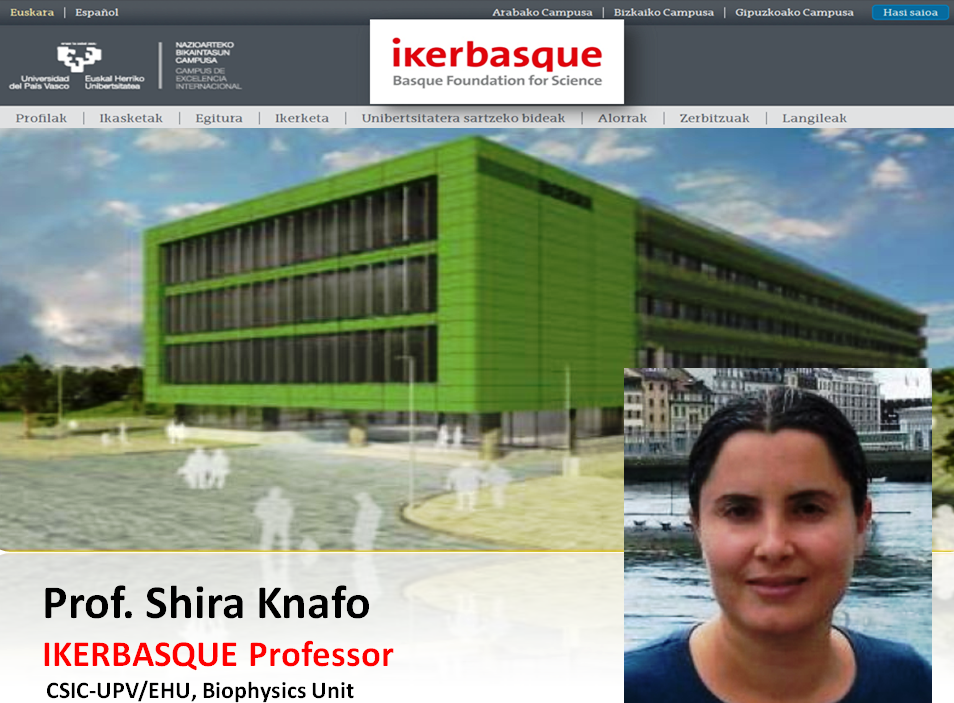
MOL2NET'23, Conference on Molecular, Biomed., Comput. & Network Science and Engineering, 9th ed.
MOL2NET: FROM MOLECULES TO NETWORKS
25–31 December 2023
Chemistry, Nanotechnology, Pharmaceutical Industry, Biomedical Engineering, Environmental Science, artificial intelligence, Big Data Analytics, Materials Science, Cheminformatics
- Go to the MOL2NET'23 CONGRESSES
-
- 01. CHEMBIO.INFO-09: Cheminfo., Chemom., Comput. Quantum Chem. & Bioinfo. Congress München, GR-Chapel Hill, USA, 2023.
- 02. CHEMBIO.MOL-09: Org. Chem., Med. Chem., Mol. Biol., & Pharm. Industry Congress, Paris, France-Fargo, USA, 2023.
- 03. NICE.XSM-09: North-Ibero-America Congress on Exp. & Simul. Methods, Valencia, Spain-Miami, USA, 2023.
- 04. BIOMODE.ECO-08: Biotech., Mol. Eng., Nat. Prod. Develop. and Ecology Congress, Paris, France-Ohio, USA, 2023.
- 05. USEDAT.NET: USA-Europe Data Analysis Trends & Complex Networks Mini Congress Series, Coruña, SP-Miami, USA, 2023
- 06. REVIEWWWERS.PUB-09, Reviewers, Pre-Prints, & Post-Publication Workshop, Bilbao-Miami, USA, 2023.
- 07. Empty session 01.
- Event Details
MOL2NET'23 Publication Phase Closed 2023-Dec-31.
REVIEWWWERS'09 Post-Publication Workshop Closed 2024-Jan-25.
Thanks, Xièxiè, Gracias, Mila esker [MOL2NET'23 Sponsors], for making it possible!
MOL2NET'23 NUMBERS!!!
PEOPLE
|
COMMUN.
|
EVENTS
|
PUBS.
|
POSTS
|
MEDIA
|
| >300 | >140 | >10 | >10 | >100 | >10000 |
PUBS. = Associated JCR Journals, Newsletters, etc.; EVENTS = Congressess, Workshops, Schools, etc.
POSTS = Post-Publication Online Queries/Answers to/from Authors; MEDIA = Followers, Facebok, Linkedin, etc.
Full/Abstr = Full Works/Abstracts Published; ??? = Not yet available.
Welcome from the Chair
All Year Online Network of >10 North America-Europe Inter-University Mini Congresses and Workshops Totally Free of Cost!!!
Topics: Chem. (All), Appl. Phys., Neuro., Nano., Biotech., Biomed. Eng., Pharm. Industry, vs. AI, Info., Comput., Net. Sci., GDPR, Copyright...
 Trans-Atlantic North America-Europe Inter-University Congresses.
Trans-Atlantic North America-Europe Inter-University Congresses.
Topics of interest. The conference as a whole is multi-disciplinary, however each congress normally focus on specific niches of interest. All congresses focus on some area at interface of Chemistry, Molecular Engineering, Biomedical Engineering, or Computational Sciences and Engineering. As results the topics of interest range from the study of small molecules phenomena to large complex networks in nature and society. This include but is not limited to, Chemistry (All areas), Mathematics (Applied), Physics (Applied), Materials Science, Nanotechnology, Biology and Life Sciences (All areas), Medicine, Biomedical Engineering, Education, along with Computer Sciences, Data Analysis, Statistics, Artificial Intelligence, Deep Learning, Bioinformatics, Systems Biology, and Complex Networks Sciences.
Conference schedule. The conference runs as year-round conference series. It means that you can submit and publish your abstracts, communications, talks, announcements, advertising, etc. during almost all the year (Publishing from February to December of the year in course). The conference has 2 stages: (1) Call for papers and (2) Discussions and Post-publication reviews. In the first stage we open independent congresses in person and/or online, receive papers, carry out pre-publication review of papers, and perform online publication. Consequently, submissions are open to be published asap upon acceptance in Sciforum platform almost all year at no cost for authors (year-round). Depending on the schedule we also run a second stage called Post-Publication stage. On the Post-publication stage we close submission of papers and invite all members of committee, authors, and validated social network followers, to become post-publication reviewers. In this moment members of all congresses can interact together on brain-storming sessions making online comments each other.
Submission steps. All scientific communications accepted will be published Totally Free of cost at platform [MOL2NET SciForum.net]. We welcome submissions of communications in original pdf presentation files (mandatory), as well as ppt presentations (optional), or mpg videos (optional), uploading .doc files (optional) is important if you shall request some post-publication correction from our part. We strongly recommend to download the conference template to write your communications [MOL2NET'23 Template.doc]. Please, do not hesitate to contact conference chairperson and/or scientific committee presidents. Please, follow these steps to submit your paper:
(2) In case your abstract is accepted, please upload the .pdf, .ppt, .mpg, and/or .doc files of your communication.
(3) Only in case you have submitted a company stand poster, science policy campaigns announcements, technology jobs recruitment calls, or technological products, scientific services, science channels advertisements please perform the Registration and APC/REGF payment (mandatory previous publication, see more information below in registration section).
MOL2NET Congresses (See Left-Side Panel). As we mentioned before, this a multidisciplinary conference formed by various interrelated congresses (Click here [MOL2NET Congresses], see the table below, or see left panel menu). Consequently, the congresses share some topics in common. However, each congress has one specific thematic niche of interest. All in all, we have a new R&D, Technology, Innovation, Industry, and Business promotion congress (CATCHTOHIT) along with a total of 5-10 Academic, Science, and Training yearly mini congresses, workshops, or training program series. In the following summarizing table you can click over the names of the congresses to follow the links to our congresses series and/or read the main topics covered by each congress. The committee can opt to transfer (pendent of author approval) a paper submission into other congress of our conference if the topic of the paper focus better on this other congress.
International Partners. Internationally, professors and researchers world around are the main partners, co-host chairs, and/or committee members. From North America side's researchers from Stanford Center for Biomedical Informatics Research (BMIR), Stanford University (STANFORD), USA; Center for the Study of Biological Complexity (CBDS) of Virginia Commonwealth University (VCU), USA; Miami Dade College (MDC), USA; North Dakota State University (NDSU), USA; Jackson State University (JSU), USA, and Carleton University (CARLETON), Canada, among others, are hosts of our congresses. From Europes's side researchers and/or professors from European Bioinformatics Institute (EMBL-EBI) Cambridge, University of Birmingham (UBIRMINGHAM), University of Portsmouth (UPORT), United Kingdom, Universität Rostock Institut für Chemie (UROSTOCK), Germany, Centre National de la Recherche Scientifique (CNRS), and Université Paris-Saclay (UPS), Paris, France, are some of the co-hosts of our congresses. In addition, other institutions are co-founders and/or supporters of this conference worldwide, plz see full list on committee.
Headquarters & Local Partners. The Local Headquarters (HQs) of this conference series are in the Faculty of Science and Technology, University of Basque Country (UPV/EHU), Basque Country, Spain. More specifically, the founders and strongest supporters of the conference are professors endowed by IKERBASQUE, Basque Foundation for Sciences (IKERBASQUE) and professors from the Dept. of Org. & Inorg. Chem. In addition, professors affiliated to Basque Centre for Biophysics (BIOFISIKA) of the University of Basque Country (UPV/EHU), and Center for Cooperative Research in Biosciences (CICBIOGUNE), with ties to previous departments are also supporters of this conference. Last, professors from the Department of Computer Sciences of the University of Coruña (UDC), Galicia, Spain act also as local co-hosting partners. Please, see full committees lists [MOL2NET HONOR & SCI COMMITTEE] and [MOL2NET-IKERBASQUE Staff]. In this sense, all these and other local and international centers acts as co-hosting partners for some of the workshop sessions of this conference.
Authors Liability. Remember that the conference publish only pre-print communications or post-print essays with summary/discussion of already published content. It means that, this conference is a way for authors to communicate their earlier results (pre-print) and/or discuss already published results from their/others groups (post-print discussion critical essays). The authors may be requested to modify the communication (re-write their texts) in the case that high similarity is detected and/or reported to the committee. The committee may decide to take-down from public web (unpublishing) a communication if sufficient evidence of of violation of ethic veracity or originality principles is reported. In these cases, the manuscript could be put on standby or withdrawn temporarily until the authors re-submit the proper version. In the post-print discussion communications the authors are also allowed to submit short reviews, comments, letters, critical assays, opinions, or discussions of papers already published.
Content Disclaimer on Text or Code Generation. The committee of this conference recognizes that automatic text or software code verification by a third part, human and/or computational, may by be useful to improve the quality of the original communication or to generate new computer code for scientific computing tasks. In particular, Artificial Intelligence (AI) algorithms such as Large Language Model (LLM), like ChatGPT, etc., or other text-generating computational tools, are valuable tools when used with responsibility. Consequently, using automatic text generation tools, like ChatGPT, is allowed only for AI software/script coding purposes or as a way to improve quality of redaction of the original text. The committee is not responsible of publication of text totally generated by a third part (human or computational) not listed as authors. Third parts like computational algorithms, language editors, etc., should not be listed as authors with their original name or using pseudonyms in similar way adding fake authors is not considered a valid practice.
Content Disclaimer on Text Originality and Veracity. Authors are recommended to performing a similarity checking, ensure veracity of contents, and carry out a proper citation of previous works. The committee is not responsible of the previous aspects (similarity, veracity, proper citation) in this publishing modality. Consequently, the opinions expressed on the communications are not necessarily coincident to the opinions of the members of the committees. In this sense, we strongly recommend the authors to use online text-similarity checking services, if possible. These tools may help authors to avoid plagiarism or copyright violation.
The committee notice all authors to be aware that the following or similar content disclaimer note will be added in due course to the online public abstract of all communications published by this conference.
*Content Disclaimer Note (Added by Committee): This conference publish preliminar pre-print communication or short post-print critical essays uploaded under author responsibility. The conference committee only do a preliminary (not exhaustive peer review) inspection of topic suitability and technical soundness. Using Artificial Intelligence (AI) algorithms such as Large Language Model (LLM), like ChatGPT, etc., or other text-generating computational tools is allowed only as a way to improve quality of redaction of the original authors text. We strongly recommend authors to using text similarity analysis tools but this is let to author's decision. In consequence, the authors are responsible of text veracity and originality. The content of publications do not express the opinion of the members of committee.
Numerus Clausus. Our committee promotes that authors collaborate each other and submit multiple works signed by the same author alone or with other. However, in order to keep balanced our papers vs. authors ratio we decided to set a numerus clausus limiting the number of papers per author. This year we decided to accept no more than 1-3 contributions per author in the same event (congress, workshop, school) and no more than 15 contributions signed by the same author in all the conference (>10 congresses, workshops, schools, etc.) in the same year. It means that if the conference have for instance 10 different events (congresses, workshops, and schools) in one year the same author will be allowed to publish a minimum of 1 and maximum of 15 contributions in the same year (distributing them in 1-3 contribution per event). All authors should be aware that the committee reserves the right to automatically reallocate the communication to another event with common topic and/or invite authors to submit their works to other event of our conference if we detect >3 contributions of the same author in the same event. In addition, the committee will decline all the communications of the same author beyond the previous limits and cordially invite the author to submit the additional works to the edition of the next year or to other conference automatically. The present numerus clausus politics have designed as an additional filter to our previous content disclaimers in order to modulate the use of AI algorithms such as LLM, like ChatGPT, etc., or other text-generating computational tools or third part human assistance. Thank you for your support.
MOL2NET - MDPI Journals Issues. MOL2NET conference committee members have been guest editors of >30 JCR journals special issues for different journals of the editorial MDPI (https://www.mdpi.com/). Please, check also the list of guest edited by conference committee members of other past and present editions to our conference [MOL2NET-MDPI JCR Journal Issues]. The impact factor is in the range 2 - 7. These issues run in journals that sponsor the conference directly and/or are edited by members of the conference committed and announced by the conference. Many of these special issues are now in call for papers, submissions are welcome in parallel, a posteriori, or totally independently from the conference. Manuscripts should be submitted online at www.mdpi.com by registering and logging in to this website. We also welcome new proposals of special issues by other colleagues to be associated to/announced by our conference. Guest editors of new issues will be listed in conference congresses committees. In order to send a proposal of associated workshop and/or special issue contact the chairperson of the conference Prof. González-Díaz H. IKERBASQUE Prof., University of the Basque Country (UPV/EHU), Biscay, Basque Country, Spain. Email: mol2net.chair@gmail.com. These journal issues follow a review and publication process (APC Apply) totally independent of the process of conference papers (APC/REGF Apply). This year the the Platinum Sponsor journal of the conference is the International Journal of Molecular Sciences (IJMS), ISSN 1422-0067, JCR IF = 6.208. More specifically the special issue:


IJMS (Call For Papers): Special Issue: Complex Networks, Bio-Molecular Systems, and Machine Learning 2.0. Journal: International Journal of Molecular Sciences IJMS (ISSN 1422-0067), JCR IF = 6.208. Topics: Chemoinformatics, Bioinformatics, QSAR/QSPR Models, Molecular descriptors, Graph Theory, Complex Networks, Protein Interaction Networks, Metabolic Networks, Machine Learning, Artificial Neural Networks (ANN), Deep Learning, Software development, Guest Editor: Prof. Humbert G. Díaz, Email: mol2net.chair@gmail.com, Department of Organic and Inorganic Chemistry, and Basque Center for Biophysics, University of the Basque Country (UPV/EHU) and Ikerbasque - Basque Foundation for Science, 48011 Bilbao, Biscay, Spain. Submissions until: 2023-Feb-28.
Thank You For Your Support!!!
MOL2NET Founder Chairman
Prof. Humbert. G. Díaz, IKERBASQUE Professor, Email: mol2net.chair@gmail.com
(1) Dept. of Organic and Inorganic Chemistry, University of the Basque Country UPV/EHU, 48940, Leioa, Greater Bilbao, Basque Country, Spain. (2) Principal Investigator (PI), CHEM.PTML LAB, BIOFISIKA UPVEHU-CSIC Institute, 48940, Leioa, Greater Bilbao, Basque Country, Spain. (3) IKERBASQUE, Basque Foundation for Science, 48011, Bilbao, Basque Country, Spain. Web of Science: https://www.webofscience.com/wos/author/record/588764
MOL2NET'23 CONGRESSES
02. CHEMBIO.MOL-09: Org. Chem., Med. Chem., Mol. Biol., & Pharm. Industry Congress, Paris, France-Fargo, USA, 2023.
03. NICE.XSM-09: North-Ibero-America Congress on Exp. & Simul. Methods, Valencia, Spain-Miami, USA, 2023.
04. BIOMODE.ECO-08: Biotech., Mol. Eng., Nat. Prod. Develop. and Ecology Congress, Paris, France-Ohio, USA, 2023.
05. USEDAT.NET: USA-Europe Data Analysis Trends & Complex Networks Mini Congress Series, Coruña, SP-Miami, USA, 2023
06. REVIEWWWERS.PUB-09, Reviewers, Pre-Prints, & Post-Publication Workshop, Bilbao-Miami, USA, 2023.
07. Empty session 01.
Registration
(2) Request your free-of-cost waiver, multiple papers reduced cost package, etc. (if any apply to you).
(3) Give your personal details and select the payment method (PayPal, Wire Transfer, etc.)
(4) Proceed to payment and/or contact us for doubts at mol2net.chair@gmail.com
Important Notes: Please, be aware that in the case of non-waived communications Abstracts accepted and/or Papers accepted for publication but not properly registered and APC/REG fees cost omission may result on Paper/Abstract Withdrawn from public web of conference. Please, note that No refund is allowed.
|
Category (Congress) |
(APC/REG)* Fees |
Notes |
|
PLATINUM AUTHORS WAIVER |
0 EUR |
Authors of Papers already published in our Platinum Sponsor Journal in 2023 do not pay MOL2NET'23 Conference Article Processing Charge/Registration (APC/REG) Fees. Please, register and upload the copy (pdf file) of your paper to obtain free-of-cost publication waiver. |
|
SOCIAL INCLUSION WAIVER |
0 EUR |
Authors of Papers submitted to a congress specifically invited/supported by a social inclusion sponsor do not pay MOL2NET'22 Conference Article Processing Charge/Registration (APC/REG) fees. Please, register and upload the copy (pdf file) of your paper to obtain free-of-cost publication waiver. Please, click the following link to see our [MOL2NET Sponsorship] program. |
|
ACADEMIC SCIENTIFIC COMMUNICATIONS |
0 EUR |
Conference papers or communications of scientific academic content are waived by our sponsors and published free of cost. In order to apply for this waiver is mandatory to avoid company, services, products, or other advertising content in the communication. |
|
AUTHORS FROM |
0 EUR |
Papers having all authors affiliated to public centers of waived countries do not pay MOL2NET'23 APC/REGF. Do not applies if at least one author is affiliated to institutions of non waived countries, private companies, or have already published one paper in this edition of the conference. Waived Countries List: AFGHANISTAN, BANGLADESH, BURKINA FASO, BURUNDI, CENTRAL AFRICAN REPUBLIC, CHAD, CONGO, CUBA, ERITREA, ETHIOPIA, GAMBIA, GUINEA, GUINEA-BISSAU, INDIA, LIBERIA, MADAGASCAR, MALAWI, MALI, MOZAMBIQUE, NEPAL, NIGER, NORTH KOREA, RWANDA, SIERRA LEONE, SOMALIA, SOUTH SUDAN, SUDAN, SYRIA, TOGO, UGANDA, UKRAINE, VENEZUELA, YEMEN. Non waived countries: all other not listed before. |
|
COMMITTEE WAIVER |
0 EUR |
Members of the committee and editors of one MDPI special issue announced by our conference do not pay APC/REGF for the first paper. The other papers pay reduced APC/REGF for multiple papers. |
|
EARLY SUBMISSION WAIVER |
0 EUR |
The first 20 conference papers uploaded before 2022-April-30 will be processed free of cost despite the category of authors as a courtesy waiver for early submission authors. This apply to full conference communications with all content included (full .pdf, .doc, .ppt, and/or .mpg files). In case your abstract is submitted and registered before 2022-April-30 but your full communication is uploaded after this date the present waiver do not applies. |
|
COMPANY STANDS |
100 EUR |
Unless they have free-of-charge waivers directly invited by the committee you should be aware that service or company-centred advertising communications (non-invited) should pay this APC/REG fee. It includes online presentations of all the aims, objectives, interests, necessities, offers, services, products, etc. of the SMEs company, you can include link to homepage, and contact info like email, LinkedIn, phone, etc. |
|
PRODUCT ADVERTISING |
100 EUR |
Unless they have free-of-charge waivers directly invited by the committee you should be aware that technological products advertising communications (non-invited) should pay this APC/REG fee. These are product centered online advertising presentations describing all the scientific basis, specificities, advantages, etc. of an innovation or technological product or prototypes like e.g., drugs, catalysts, vaccines, diagnostic kits, nutraceuticals, reactants, biomaterials, may include contact info to buy the product. |
|
EQUIPMENT DEMO |
100 EUR |
Unless they have free-of-charge waivers directly invited by the committee you should be aware that technological products advertising communications (non-invited) should pay this APC/REG fee. These are equipment centered commercial advertising papers, you may include scientific basis of function of a technological equipment or prototype, demonstrations of the use of the equipment (videos), advantages, buying info, etc. Examples are DNA sequencers, Quantum computers, HPLC chromatograph or columns, Electrophoresis, High Resolution and Electronic Microscopes, X-Ray, NMR, MS, IR, or UV spectroscopy equipment, IR cameras, etc. |
|
SOFTWARE RELEASE |
100 EUR |
Unless they have free-of-charge waivers directly invited by the committee you should be aware that technological products advertising communications (non-invited) should pay this APC/REG fee. These are software centered commercial advertising papers, including, user manual, etc. describing new scientific software, online platforms, APIs, Cybersecurity tools, Smartphone applications, Artificial Intelligence (AI) tools, etc., may include links to buying and downloading the software. |
|
SCIENTIFIC SERVICE OFFER |
100 EUR |
Unless they have free-of-charge waivers directly invited by the committee you should be aware that technological products advertising communications (non-invited) should pay this APC/REG fee. These are scientific-service centered commercial advertising papers, including description of a scientific service like drug testing platform, sequencing platform, spectroscopy general service, technology consulting service, regulatory issues consultancy, etc. May include links, contact information, etc. of the service provider. |
|
CALLS FOR WEBINARS, etc. |
100 EUR |
Unless they have free-of-charge waivers directly invited by the committee you should be aware that technological products advertising communications (non-invited) should pay this APC/REG fee. These are calls with short pdf flyers, posters, or video announcing calls for conferences, HR recruitment, Projects competitive calls, training courses, webinars, boot camps, etc. Contact: mol2net.chair@gmail.com |
|
EDITORIAL & DATA ANALYSIS SUPPORT (All Congresses) |
500 EUR |
Authors requiring editorial assistance or support of our experts with paper framing, writing and language correction, and/or data analysis, chemoinformatic, bioinformatics, or complex network data analysis towards paper publication must pay this APC/REG fee per paper. Contact: mol2net.chair@gmail.com |
* The official APC/REG fees are those in EUR, the values of APC/REG fees in other currencies (USD and CNY) are estimated costs, they may change because the platform will convert them automatically from selected currency (EUR or USD) to EUR in the moment of payment.
| Price | |
|---|---|
| ADVERTISING (Company Stand, Products, Services, Campaigns, Channels, etc.) | 100.00 EUR |
List of accepted submissions (105)
| Id | Title | Authors | Presentation Video | Poster PDF | |||||||||||||||||||||||||||||||||||||
|---|---|---|---|---|---|---|---|---|---|---|---|---|---|---|---|---|---|---|---|---|---|---|---|---|---|---|---|---|---|---|---|---|---|---|---|---|---|---|---|---|---|
| sciforum-071675 |
Physicochemical differences and antifungal activity of citral isomers: neral and geranial
, Aline Santos ,
Jessica De Moura ,
,
Paulo Pereira ,
Igor De Araujo ,
Nikole Trigueiro ,
Ana Vital ,
Marcus Scotti ,
Luciana Scotti ,
Submitted: 27 Feb 2023 Abstract: Show Abstract |
,
Aline Santos ,
Jessica De Moura ,
,
Paulo Pereira ,
Igor De Araujo ,
Nikole Trigueiro ,
Ana Vital ,
Marcus Scotti ,
Luciana Scotti ,
|
N/A | N/A |
Show Abstract |
||||||||||||||||||||||||||||||||||||
|
The citral is a monoterpene composed of two isomers: neral and geranial. These molecules have several pharmacological activities, such as antioxidant, anti-inflammatory, and antifungal. Therefore, this work analyzed the physicochemical differences of the citral isomers and a case study of their antifungal activity. *Content Disclaimer Note (Added by Committee): This communication is a preprint uploaded under author responsibility. The Congress committee, only do a preliminary inspection of topic suitability. The content of this preprint communication is responsibility of authors and do not express the opinion of the members of committee. The committee is not responsible from content veracity or originality. Using automatic text generation tools, like ChatGPT, is allowed only for AI software/script coding purposes or as a way to improve quality of redaction of the original text. We recommend using text similarity analysis tools but this an author's decision. |
|||||||||||||||||||||||||||||||||||||||||
| sciforum-071749 | Efficient numerical evaluation of weak restricted compositions | N/A | N/A |
Show Abstract |
|||||||||||||||||||||||||||||||||||||
|
We propose an algorithm to calculate the number of weak compositions, wherein each part is restricted to a different range of integers. This algorithm performs different orders of approximation up to the exact solution by using the Inclusion-Exclusion Principle. The great advantage of it with respect to the classical generating function technique is that the calculation is exponentially faster as the size of the numbers involved increases. *Content Disclaimer Note (Added by Committee): This communication is a preprint uploaded under author responsibility. The Congress committee, only do a preliminary inspection of topic suitability. The content of this preprint communication is responsibility of authors and do not express the opinion of the members of committee. The committee is not responsible from content veracity or originality. Using automatic text generation tools, like ChatGPT, is allowed only for AI software/script coding purposes or as a way to improve quality of redaction of the original text. We recommend using text similarity analysis tools but this an author's decision. |
|||||||||||||||||||||||||||||||||||||||||
| sciforum-071741 | Resource Consonance in 5G Technologies |
,
Prof G.P. Gadkar
|
N/A | N/A |
Show Abstract |
||||||||||||||||||||||||||||||||||||
|
Heterogeneous architecture is an underlining feature of 5G, however deployment and management of HetNets in 5G scenarios is yet to be explored. Given the need to satisfy overwhelming capacity demands in 5G, mm-wave spectrum (3-300 GHz) is expected to offer a very compelling long term solution by providing additional spectrum to 5G networks. Hence, the challenge is the integration of mm-wave in heterogeneous and dense networks as well as the backward compatibility and integration with legacy 4G/3G networks. Furthermore, Cloud radio access networks (C-RAN) contribution to 5G is considered as a cost effective and energy efficient solution for dense 5G deployment. From an energy point of view, cost and energy consumption are major considerations for 5G. C-RAN and energy efficiency techniques could help in performance improvements. Although HetNets were introduced in 4G networks, their complexity has increased in 5G networks. In this paper, we will try to build a clear image of HetNets in 5G cellular networks. We consider different technologies with a special focus on mm-wave networks given its important role in 5G networks. We then address the available standards in HetNets that allow interworking and multihoming between different radio access technologies. Afterwards, we consider the virtualization of 5G HetNets and its benefits. Different resource allocation strategies in the literature are also presented for single-resource as well as for multi-resources. Finally, we give an overview of existing works addressing energy efficiency strategies in 5G networks. *Content Disclaimer Note (Added by Committee): This communication is a preprint uploaded under author responsibility. The Congress committee, only do a preliminary inspection of topic suitability. The content of this preprint communication is responsibility of authors and do not express the opinion of the members of committee. The committee is not responsible from content veracity or originality. Using automatic text generation tools, like ChatGPT, is allowed only for AI software/script coding purposes or as a way to improve quality of redaction of the original text. We recommend using text similarity analysis tools but this an author's decision. |
|||||||||||||||||||||||||||||||||||||||||
| sciforum-071797 | Documentation of medicinal plants used to treat cardiovascular ailments in the Rif region of northern Morocco. |
,
Lahcen Zidane
|
N/A | N/A |
Show Abstract |
||||||||||||||||||||||||||||||||||||
|
Background: Moroccans have used medicinal plants for centuries to treat various human and cattle health issues. However, there is a need for more research to document and share indigenous ethnopharmacological knowledge. In this study, we aimed to identify medicinal plants indigenous people in the Rif region used to treat cardiovascular problems and assess their ethnomedicinal abilities. Methods: From 2016 to 2018, we conducted an ethnobotanical study in the Moroccan Rif area, surveying 520 traditional herbalists and consumers. We used quantitative ethnobotanical indicators such as family importance value (FIV), the relative frequency of citation (RFC), plant part value (PPV), fidelity level (FL), and informant consensus factor (ICF) to analyze the data. Results: Our analysis revealed 33 plant species from 20 families, with Poaceae being the most dominant (7 species). Among the cardiovascular disorders treated, cardiac arrhythmias had the highest ICF (0.98). Leaves were the most frequently used plant part (PPV = 0.353), and decoction was the most common preparation method (31%). Conclusions: Our study found evidence of indigenous ethnomedicinal knowledge of medicinal plants used to treat cardiovascular illnesses in the Moroccan Rif. We recommend further phytochemistry, pharmacology, and toxicology research to discover new drugs from these documented medicinal plants. *Content Disclaimer Note (Added by Committee): This communication is a preprint uploaded under author responsibility. Consequently, the content of this preprint communication is responsibility of authors and do not express the opinion of the members of committee. The congress committee only do a preliminary inspection of topic suitability. The committee is not responsible from content veracity or originality. Using automatic text generation tools, like ChatGPT, is allowed only for AI software/script coding purposes or as a way to improve quality of redaction of the original text. We recommend using text similarity analysis tools but this an author's decision. |
|||||||||||||||||||||||||||||||||||||||||
| sciforum-071807 |
Theoretical comparison between α, β-amyrin isomers against Staphylococcus aureus
Nikole Trigueiro ,
Paulo Pereira ,
Igor De Araujo ,
Jessica De Moura ,
,
,
Alex Monteiro
Submitted: 04 Mar 2023 Abstract: Show Abstract |
Nikole Trigueiro ,
Paulo Pereira ,
Igor De Araujo ,
Jessica De Moura ,
,
,
Alex Monteiro
|
N/A | N/A |
Show Abstract |
||||||||||||||||||||||||||||||||||||
|
The progressive spread of antibiotic-resistant microorganisms is a public health problem, so |
|||||||||||||||||||||||||||||||||||||||||
List of Authors (224)
Sponsors and Partners








3. EPSRC First Grant (Project): Project focused on Perovskite/Nitrogen-doped Carbon electrospun nanofibres research supports the work of one of the NANOBIOMAT host institution chairpersons. Project Principal Investigator (PI): Prof. Ana Belen Jorge Sobrido, Queen Mary University of London (QMUL), Funding Agency: Engineering and Physical Sciences Research Council (EPSRC). Code: EPSRC (EP/R035571/1, EP/V047523/1), United Kingdom. Silver Sponsor of: NANOBIOMAT-09: Nanotechnology & Biomaterials Sci. Congress. Birmingham & Glasgow, UK-Jackson & Fargo, USA, 2023.





























Biomedical, & Computational Sciences and Engineering, ISSN: 2624-5078, MDPI SciForum, Basel, Switzerland, since 2015.
We are open to discuss with you tailored conditions of your sponsorship and contribution to the conference.
See pre approved modalities of sponsorship in the [MOL2NET'23 Sponsors Call], feel free to contact us: mol2net.chair@gmail.com
Advisory Committee
MOL2NET Honor Advisory Committee
*Note: This committee is for MOL2NET Conference Series, to see the committees of each specific workshops associated to the conference visit the page of this workshop.
Honor Advisory Committee
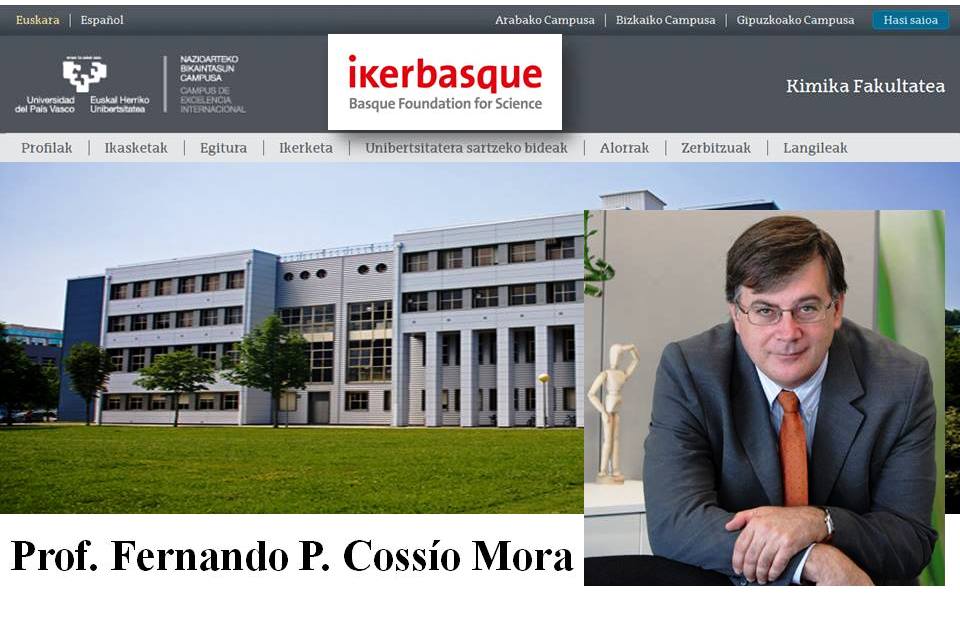 Prof. Fernando P. Cossío, (IKERBASQUE Foundation President), Prof. Dept. of Organic Chemistry I,
Prof. Fernando P. Cossío, (IKERBASQUE Foundation President), Prof. Dept. of Organic Chemistry I,
University of Basque Country (UPV/EHU), Donostia - San Sebastián Campus, Gipuzkoa.

Prof. Iseult Lynch, School of Geo., Earth and Environ. Sci., Univ. of Birmingham, Birmingham, United Kingdom.
(NANOBIO.MAT Congress Series Honor Chairperson)
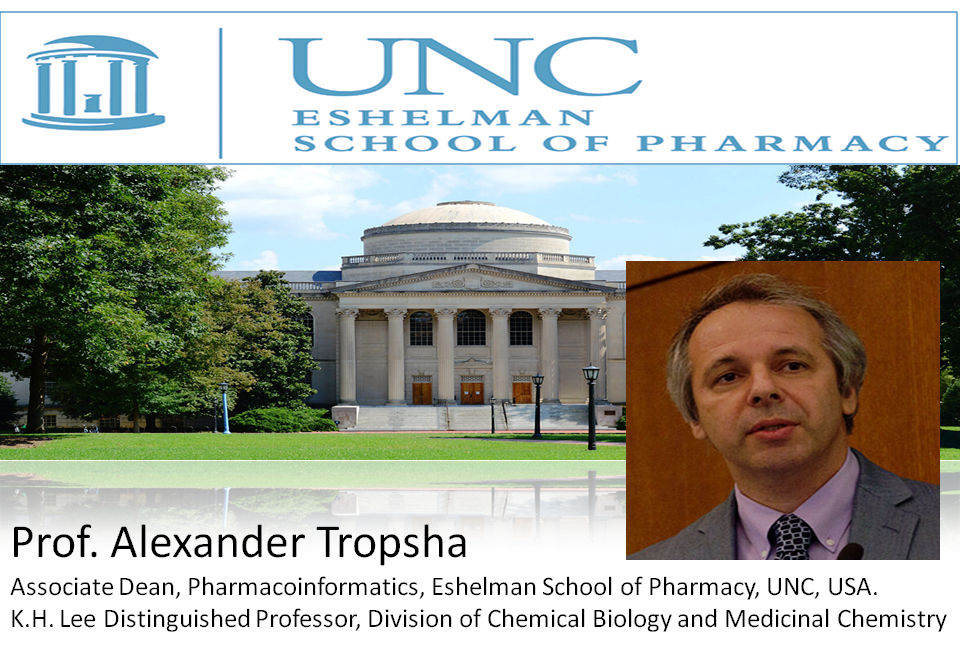
Prof. Alexander Tropsha, Assoc. Dean UNC Eshelman School of Pharmacy, Assoc. Editor J. Chem. Info. Model., ACS, USA. University of North Carolina (UNC), Chapel Hill , North Carolina 27599 , United States.
(CHEMBIO.INFO Congress Series Honor Chairperson)

Prof. Marianne Graber, Directrice Adjointe Relations Internationales, Faculté des Sciences et Technologies, Université de La Rochelle, La Roche, France. Chercheur, Laboratoire LIENSs Littoral Environnement et Sociétés, Institut écologie et environnement (IEE), French National Centre for Scientific Research (CNRS), Paris, France.
 Prof. Jia Zhou, Department of Pharmacology and Toxicology, University of Texas Medical Branch, Galveston, Texas, USA.
Prof. Jia Zhou, Department of Pharmacology and Toxicology, University of Texas Medical Branch, Galveston, Texas, USA.
(EIC Current Topics in Medicinal Chemistry).

Dr. Shameer Khader, SANOFI, Executive Director, Artificial Intelligence, Cambridge, Massachusetts, USA.

Prof. María Isabel Loza, CiMUS, Vice-Director , Dept. of Pharmacology, Univ. of Santiago de Compostela USC, Galicia, Spain.
Prof. James Robert Green, Dept. of Systems and Comput. Eng., Carleton University, Carleton, Canada.

Prof. Rosa María Hernández, Faculty of Pharmacy, University of Basque Country, Vitoria, Basque Country, Spain.

Prof. Weifan Zheng, Department of Pharmaceutical Sciences, North Carolina Central University, Durham, USA.
 Prof. Ramón J. Estévez Cabanas, CIQUS and Dept. of Organic Chemistry, USC, Spain.
Prof. Ramón J. Estévez Cabanas, CIQUS and Dept. of Organic Chemistry, USC, Spain.

MOL2NET-UPVEHU HQ Honor Advisory Committee
*Note: This committee is for MOL2NET Conference Series, to see the committees of each specific workshops associated to the conference visit the page of this workshop.

Prof. Inmaculada Arostegui, Vice-Rector of Research, Email: vrinvestigacion@ehu.eus
Dept. of Applied Mathematics and Statistics, University of The Basque Country UPV/EHU, Bilbao, Spain.
Basque Center for Applied Mathematics (BCAM), [MOL2NET Welcome Video, Ongi Etorri Video (Euskera)]
Prof. Fernando Plazaola, Dean Fac. of Sci. and Tech.,
Prof. Izaskun Gil de Muro, Dir. Dept. of Org. and Inorg. Chem., , Sec. Dept. of Org. and Inorg. Chem., Headquarters Academic Pursuit Committee Chairpersons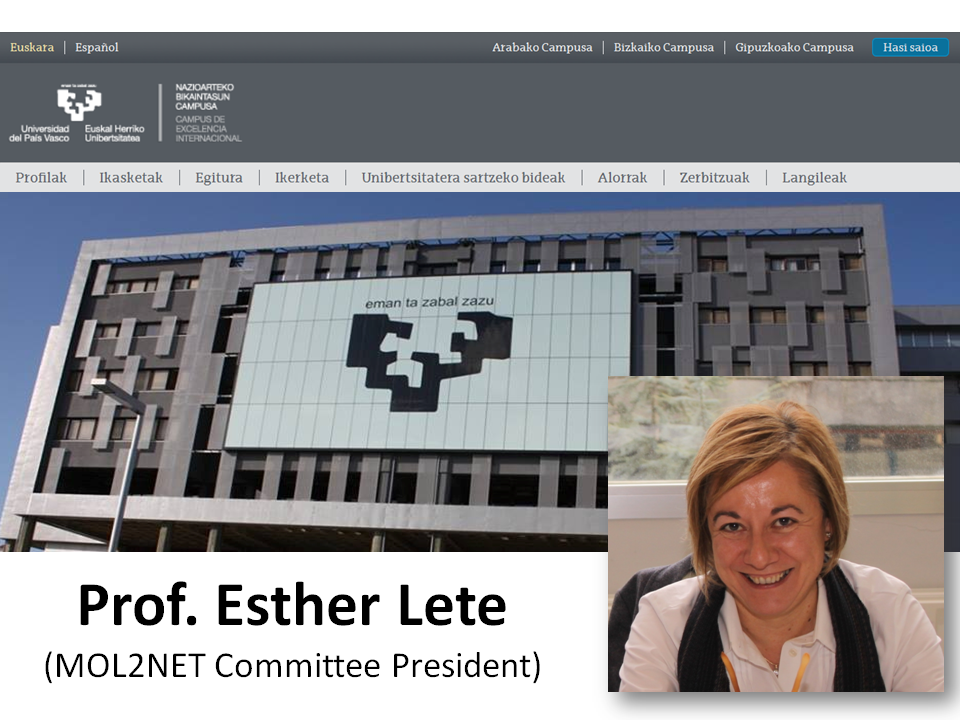
Prof. Esther Lete, Dept. of Org. and Inorg. Chem., (Coordinator Ph.D. Synth. & Ind. Chemistry)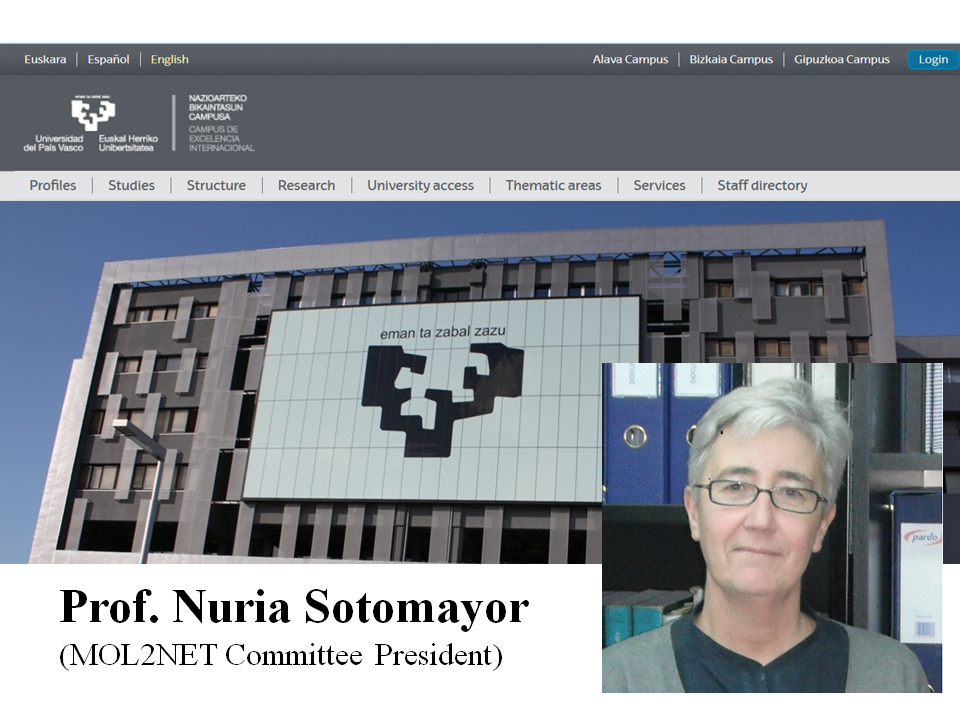
Prof. Nuria Sotomayor, Dept. of Org. and Inorg. Chem., Basque Country, Spain. (Coordinator M.Sc. Synth. & Ind. Chemistry)
MOL2NET Scientific Committee (Abroad)
*Note: This committee is for MOL2NET Conference Series, to see the committees of each specific congress or workshop associated to the conference please visit the page of this event.
MOL2NET Advisory Scientific Committee
President of Advisory Scientific Committee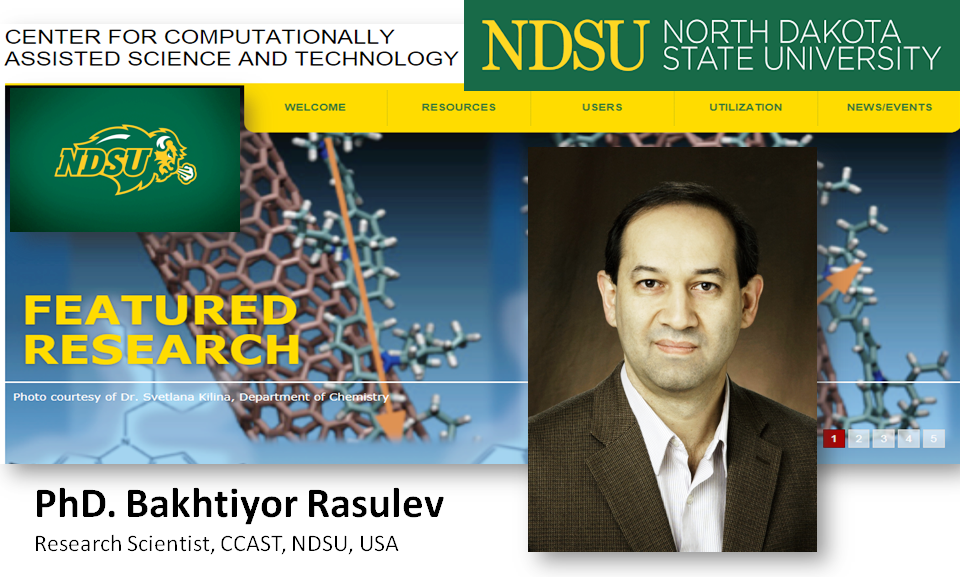
Prof. Bakhtiyor Rasulev, Department of Coatings and Polymeric Material, North Dakota State University, Fargo, USA.
Chairperson of Advisory Scientific Committee (Chemical Sciences) 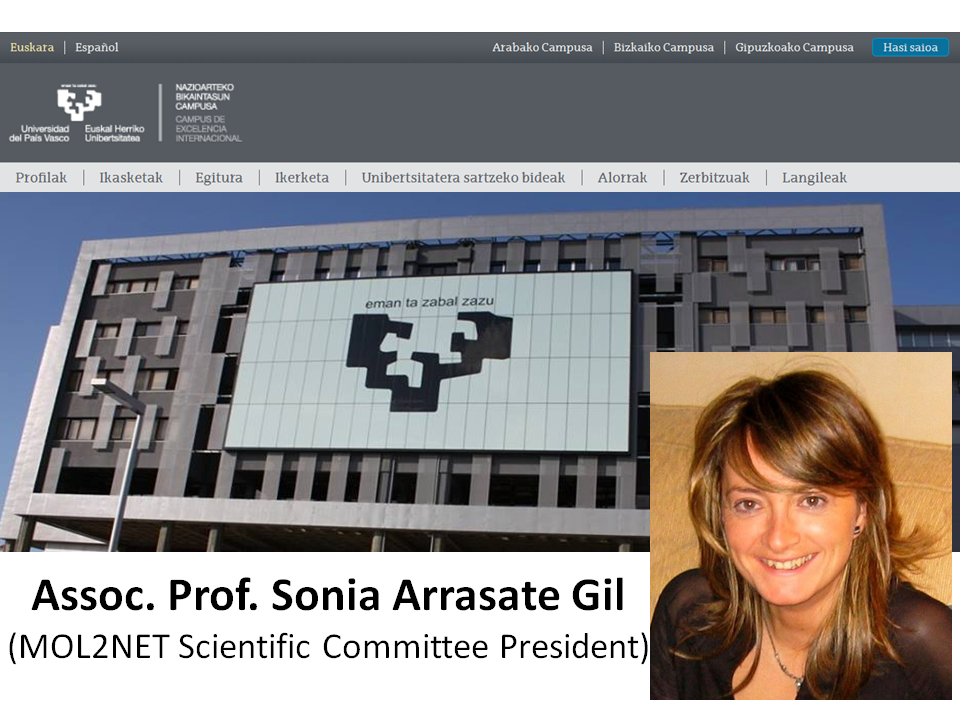
Prof. Sonia Arrasate, Department Organic and Inorganic Chemistry, UPV/EHU, Leioa, Greater Bilbao, Basque Country, Spain.
sonia.arrasate@ehu.eus
Chairperson of Advisory Scientific Committee (Environmental Sciences)
Chairperson of Advisory Scientific Committee (Physical Sciences)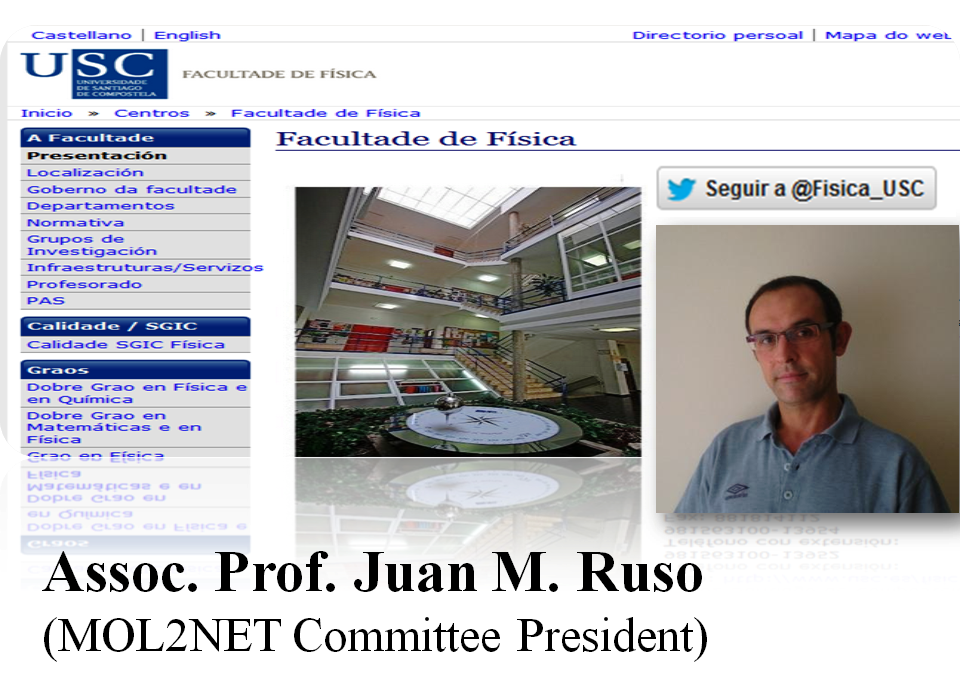
Prof. Juan M. Ruso, Faculty of Physics, University of Santiago de Compostela (USC), Galicia, Spain.
Email: juanm.ruso@usc.es
Chairperson of Advisory Scientific Committee (Neurosciences)
Prof. Shira Knafo, IKERBASQUE Professor, Molecular Cognition Laboratory, (1) Biophysics Institute (CSIC, UPV/EHU), Scientific and Technological Park of Biscay. University of The Basque Country UPV/EHU, Biscay, Spain. Ikerbasque, Basque Foundation for Science. (2) Ben-Gurion University of the Negev Faculty of Health Sciences: Beer Sheva, Southern, Israel.
Chairperson of Advisory Scientific Committee (ICT & Legal Informatics)

Dr. Aliuska Duardo Sanchez (Ph.D. Legal Informatics), UPVEHU Postdoctoral Researcher, IKERDATA S.L. University of The Basque Country UPV/EHU, Leioa, 48940, Greater Bilbao, Basque Country, Spain.
Scientific Committee Members
Advisory Scientific Committee (North America)
Prof. Eugene Muratov, Eshelman School of Pharm., Univ. of North Carolina (UNC), Chapell Hill, USA.
Prof. Matthew M. Montemore, Chem. & Biomol. Eng., Tulane University, New Orleans, USA.
Dr. Vincent Blay Roger, Lawrence Berkeley National Laboratory, Berkeley, CA, USA.
Dr. Subhash C. Basak, Dept. of Chem. and Biochem., University of Minnesota, Duluth, MN, USA.
Dr. David Quesada, Nova Southeastern University (NSU), Fort Lauderdale, Miami, FL, USA.
Prof. Robersy Sánches, Eberly College of Science, Pennsylvania State University (PennState), PA, USA.
Prof. Matthew M. Montemore, Dept. Chem. & Biomol. Eng., Tulane University, New Orleans, LA, USA.
Dr. Gerardo M. Casañola, Dept. of Coat. and Polym. Mat., North Dakota State University, Fargo, ND, USA.
Dr. Diana Herrera, College of Veterinary Medicine, Kansas State University, Manhattan, Kansas, USA.
Dr. Gerardo M. Casañola, Dept. of Coat. and Polym. Mat., North Dakota State University, Fargo, ND, USA.
Prof. Vanessa Aguiar-Pulido, University of Miami, FL, USA.
Dr. Robersy Sánchez, Penn State University, Pennsylvania, USA.
Advisory Scientific Committee (Europe)
Prof. Ana Belen Jorge Sobrido, Queen Mary University of London, London, United Kingdom.
Dr. Igor Tetko, Inst. of Struct. Biol., Helmholtz Zentrum München, Neuherberg, Germany.
Dr. Yasset Perez-Riverol, European Bioinformatics Institute (EMBL-EBI), Cambridge, United Kingdom.
Prof. Agostinho Antunes, CIIMAR, Interdisc. Centre of Marine and Environ. Research, Porto, Portugal.
Dr. Guillermin Agüero, CIIMAR, Interdisc. Centre of Marine and Environ. Research, Porto, Portugal.Prof. Irina Moreira, Center for Neuroscience and Cell Biology (CNC), Univ. of Coimbra, Coimbra, Portugal.Prof. Davide Ballabio, Chemometrics Group, Università of Milano-Bicocca (UNIMIB), Milano, Italy.Prof. Natalia D.S. Cordeiro, Dept. of Chem. and Biochem., University of Porto, Porto, Portugal.Dr. Alla Toropova, Istituto di Ricerche Farmacologiche Mario Negri, Milano, Lombardy, Italy.
Dr. Andrey Toropov, Istituto di Ricerche Farmacologiche Mario Negri, Milano, Lombardy, Italy.
Thank You For Your Support!!!
MOL2NET Founder Chairman
Prof. Humberto González-Díaz, IKERBASQUE Professor, Email: mol2net.chair@gmail.com
(1) Dept. of Organic & Inorganic Chemistry, University of the Basque Country UPV/EHU , 48940, Leioa, Biscay, Spain.
(2) Basque Center for Biofisics, University of the Basque Country UPV/EHU , 48940, Leioa, Biscay, Spain.
(3) IKERBASQUE, Basque Foundation for Science , 48011, Bilbao, Biscay, Spain.
Web of Science: https://www.webofscience.com/wos/author/record/588764
ORCID: https://orcid.org/0000-0002-9392-2797
JCR Journal Issues

JCR Journals Issues (Editited by Conference Committee)




46. Metabolites (Published): Special Issue: Toxicity and Ecotoxicity Mechanisms of Heavy Metals on Human Health and Environment. Journal: Metabolites (ISSN 2218-1989), IF = 5.581. Editors: Dr. Rashid Mir, Department of Medical Laboratory Technology, Division of Molecular Biology, University of Tabuk, Tabuk 71491, Saudi Arabia. Prof. Marianne Graber, Laboratoire LIENSs Littoral Environnement et Sociétés, Institut écologie et environnement (IEE), French National Centre for Scientific Research (CNRS), Paris, France. Submission until: 2023-Agu-20.



JCR Journals Issues (Past Editions)
42. Pharmaceutics (Published): Special Issue: Crossing the Blood–Brain Barrier and Targeting the Brain to Meet the Challenge of CNS Diseases. Journal: Pharmaceutics (ISSN 1999-4923), JCR IF = 6.525. Topics: brain targeting, nanomedicines, drug conjugates, nose-to-brain delivery, brain diseases and tumors, in vitro nasal and blood-barrier models. Editor: Prof. Aikaterini Lalatsa, School of Pharmacy and Biomedical Sciences, John Arbuthnot Building, Robertson Wing, University of Strathclyde, 161 Cathedral Street, Glasgow G1 1LG, United Kingdom. Submissions Until: 2022-Nov-25.






36. Chemosensors (Published): Special Issue: Analytical and Computational Systems in Biosensing. Journal: Chemosensors (ISSN 2227-9040), JCR IF = 4.229. Editors: Dr. Jose Manuel Andrade, Group of Applied Analytical Chemistry, University of A Coruña, CITIC, A Coruña 15071, Spain. Prof. Marcos Gestal Pose, Department of Computer Science and Information Technologies, Research Centre in Information and Communications (CITIC), Faculty of Computer Science, University of A Coruña, CITIC, A Coruña 15071, Spain. Submission Until: 2022-May-31.







29. Applied Sciences (Call For Papers): Special Issue: Analytical and Computational Systems in Biosensing. Journal: Applied Sciences (ISSN 2227-9040), JCR IF = 2.838. Topics: Artificial Intelligence, Data Science And Engineering, Machine Learning, Deep Learning, Computer Vision, Population Monitoring, Big Data, 5g Communication, Positive Technology. Editors: Prof. Javier Pereira, Faculty of Health Sciences, University of A Coruña, Spain. Prof. Manuel F. González Penedo, Research Centre in Information and Communications (CITIC), Faculty of Computer Science, University of A Coruña, CITIC, A Coruña 15071, Spain. Submission Until: 2021-Dec-31.

28. Metabolites (Published): Special Issue: The Impact of Marine Chemical Pollution to Microorganism Metabolites. Journal: Metabolites (ISSN 2218-1989), JCR IF = 5.581. Editor: Prof. Marianne Graber, Laboratoire LIENSs Littoral Environnement et Sociétés, Institut écologie et environnement (IEE), French National Centre for Scientific Research (CNRS), Paris, France. Email: marianne.graber@univ-lr.fr. Closed: 2021-Nov-15.





23. Biomolecules (Call For Papers): Special Issue: Computational Approaches for the Discovery and Development of Pharmacologically Active Natural Products. Journal: Biomolecules (ISSN 2218-273X). JCR IF = 6.064. Editor: Prof. Jose L Medina-Franco, National Autonomous University of Mexico (UNAM), México. Closed: 2021-Feb-28


21. Pharmaceutics (Published): Special Issue: Nanosystems as Drug Delivery Carrier: From Nature to the Medication. Journal: Pharmaceutics (ISSN 1999-4923), JCR IF = 6.525. Topics: drug delivery systems, cyclodextrin, nanomedicine, active drugs, bioavailability. Editor: Prof. Eduardo Sobarzo-Sanchez, Email: eduardo.sobarzo@ucentral.cl, Instituto de Investigación e Innovación en Salud, Facultad de Ciencias de la Salud, Universidad Central de Chile, Chile. Closed: 2020-Oct-31.





16. Biology (Call For Papers): Special Issue: Computational Biology. Journal: Biology (ISSN 2079-7737) JCR IF = 3.796. Topics: computational biology, mathematical modeling, computational simulation, statistics, biochemistry, biophysics , molecular biology, computer science, anatomy, biomodeling, genomics, genetics, neuroscience, pharmacology, evolutionary biology. Editors: Dr. Milan Toma, Department of Osteopathic Manipulative Medicine, College of Osteopathic Medicine, New York Institute of Technology, Old Westbury Campus, Northern Boulevard, Old Westbury, NY 11568-8000, USA. Dr. RiccardoConcu, Requimte/Faculdade de Ciências da Universidade do Porto, Rua do Campo Alegre, s/n, 4169-007 Porto, Portugal. Submissions until: 30 Dec 2020.
15. Biomolecules (Published): Special Issue: Relevant Biomolecules for Germ Cells and Fertilization. Journal: Biomolecules (ISSN 2218-273X). JCR IF = 6.064. Topics: Germ cells, Gamete quality, Cryopreservation, Biomarkers, Antioxidants. Guest Editors: Prof. Vanessa Robles, Email: robles.vanesa@gmail.com, MODCELL Group, Department of Molecular Biology, Universidad de León, 24071 León, Spain. Dr. Marta F. Riesco, Spanish Institute of Oceanography (IEO), Santander, 39012, Spain, Dr. David G. Valcarce, Spanish Institute of Oceanography (IEO), Santander, 39012, Spain. Closed: 15 February 2020.






09. Nanomaterials (Published): Special Issue: From Nanoinformatics to Nanomaterials Risk Assessment and Governance. Journal: Nanomaterials (ISSN 2079-4991), JCR IF = 4.324. Editors: Prof. Dario Greco, Faculty of Medicine and Health Technology, Tampere University, Tampere, Finland. Dr. Antreas Afantitis, Department of Cheminformatics, NovaMechanics Ltd, Nicosia, Cyprus. Prof. Iseult Lynch, School of Geography, Earth & Environmental Sciences, Univ. of Birmingham, United Kingdom. Dr. Maria Dusinska , Norwegian Institute for Air Research, NILU, Kjeller, Norway. Prof. Miguel A. Banares, Institute for Catalysis, CSIC, Madrid, Spain. Closed: 2020-Sept-01,

08. Molecules (Call For Papers): Special Issue: Recent Advances in Computational Drug Discovery: From In Silico Screening to Multiscale De Novo Drug Design. Journal: Molecules (ISSN 1420-3049), JCR IF = 3.267. Last Date: 2020-Jan-31. Topics: Multi-Scale De Novo Drug Design, Multi-Scale Models, QSAR-Based Approaches, Chemoinformatics, Bioinformatics, Big Data and Data Mining, Computer-Aided Drug Discovery, and Virtual Screening. Editor: Prof. Alejandro Speck-Planche, Email: alejspivanovich@gmail.com, Department of Chemistry (Institute of Pharmacy), I.M. Sechenov First Moscow State Medical University, Moscow, Russian Federation.


06. Molecules (Call For Papers): Special Issue: Computational Methods for Drug Discovery and Design. Journal: Molecules (ISSN 1420-3049), JCR IF = 3.098. Last Date: 2019-Dec-30. Topics: molecular modeling; molecular simulations; computational biochemistry; computer-aided drug design; protein kinase inhibitors. Editor: Prof. Julio Caballero, Email: jcaballero@utalca.cl, Centro de Bioinformática y Simulación Molecular (CBSM), Facultad de Ingeniería, Universidad de Talca, Casilla 747, Talca 3460000, Chile.

05. Molecules (Published): Special Issue: GPCR Mechanism and Drug Design. Journal: Molecules (ISSN 1420-3049), JCR IF = 3.06. Last Date: 2019-Nov-30. Topics: data science; drug design and discovery; computational chemistry; structural biology; molecular modeling; molecular docking; computational mutagenesis; G-protein-coupled receptors; protein–protein interactions; protein–ligand interactions. Workshop Associated: EJIBCE, Encontro de Jovens Investigadores de Biologia Computacional e Estrutural, Portugal, 2018. Editor: Dr. Irina Moreira, Email: irina.moreira@cnc.uc.pt, Center for Neuroscience and Cell Biology (CNC), University of Coimbra (UC), Portugal.

04. Molecules (Published): Special Issue: From Computational Chemistry to Complex Networks. Journal: Molecules (ISSN 1420-3049), JCR IF = 3.06. Topics: Quantum Mechanics /Molecular Mechanics (QM/MM), Drug-target, protein-protein and other Docking methods, Monte Carlo (MC) methods, Quantitative Structure-Activity/Property Relationships (QSAR/QSPR) models, Graph theory and Complex Networks Topological Indices (TIs), Protein Structure Networks, Protein Interaction Networks (PINs) and Proteome. Editor: Prof. Humbert González-Díaz, Email: mol2net.chair@gmail.com, Current Affiliation: IKERBASQUE Professor, Dept. of Organic Chemistry II, University of the Basque Country UPV/EHU , 48940, Leioa, Biscay, Basque Country, Spain.

03. Entropy (Published): Special Issue: Graph and Network Entropies. Journal Entropy (ISSN 1099-4300), JCR IF = 2.419. Topics: network sciences; walk entropies; algebraic graph theory; spectral methods; matrix functions. Editor: Prof. Ernesto Estrada, Email: ernesto.estrada@strath.ac.uk, Department of Mathematics & Statistics, University of Strathclyde, Glasgow G11XQ, United Kingdom. Current Affiliation: ARAID Professor, Institute of Applied Mathematics (IUMA), University of Zaragoza, Spain.

02. Entropy (Published): Special Issue: Biological Statistical Mechanics. Journal Entropy (ISSN 1099-4300), JCR IF = 2.494. Topics: cell differentiation, biocomplexity, order and organization, ecology, epidemics, correlation dynamics, complex networks, systems biology. Editors: Prof. Alessandro Giuliani, Email: alessandro.giuliani@iss.it, Environment and Health Department, Istituto Superiore di Sanità, Roma 00161, Italy. Prof. Mariano Bizzarri, Department of Experimental Medicine, Systems Biology Group Lab, Sapienza University of Rome, Rome, Italy. Closed: 2019-Nov-15.

Advertising Opportunies

R&D Company flyers, Products advertising, Services offers, Software, Congress calls ... are welcome!!!
Folletos de empresas, Publicidad de productos, Ofertas de servicios, Anuncios ... son bienvenidos!!!
Enpresen liburuxkak, Produktuen publizitatea, Zerbitzuen eskaintzak, ... ongi etorriak dira!!!
In all cases, thank you very much for contacting us, please act as follow.
In case (3), thank you for your interest please continue reading and take advantage of our advertising opportunities.
CATCHTOHIT-03 R&D Advertising opportunities
MOL2NET Conference & IKERDATA S.L. organize the CATCHTOHIT congress series to promote academy-industry relationships
services, courses, newsletters, channels, and/or calls for congresses, job offers, webinars, consortiums partners, etc. ...
Technology, Bilbao-Doylestown-Gaithersburg, Washington, USA, 2022.
(1) Firstly, click the [CATCHTOHIT Advertising Submit Now] button to upload the your R&D advertising summary.
FAQS About Conference

Article processing charges may apply depending on the journal, contact guest editors.
discussions about previous papers authored by you or other authors.
However, some associated workshops and event run in person at the co-host centers.
Conference Privacy Policy
Conference Privacy Policy
Any personal data you provide will be processed in compliance with relevant EU and national data protection laws. By agreeing to submit your information to us, we will process your personal data in accordance with the purposes, requirements and restrictions defined below
What do we use your personal information for?
- Inform about the different academic and research activities promoted by Mol2Net conference through our social media YouTube, SciForum, ResearchGate, Facebook, LinkedIn, and mailing list.
- Registration to Mol2Net events (Congresses/online courses/Mutual Learning Platform tool).
What personal information do we collect?
For the sole purpose of each activity, duly informed in the framework of the same, the only data PANLEFIT will collected are:
- (a) First and last name of authors
- (b) Institutional Email for registration and contact
- (c) Institution Affiliation name and address
- (d) APC/REGF payment mandatory information.
Why do we use your personal information?
The legal basis that allows us process your personal data is the consent you have given to complete and send the forms enabled on the website of our social medias referred above.
Mol2Net does not provide your personal data to third parties, unless it is necessary to comply with a legal mandate.
How long will we keep your personal information?
Your personal information will be used until the purpose for which it was collected; it may be archived for up to five years after the end of the current edition of Mol2Net conference. The date extends if you participate in future editions correspondingly or until you withdraw your consent, after which point it will be deleted from Mol2Net chairperson files. Deletion from social media like YouTube, SciForum, ResearchGate, Linkedin, Twitter, or Facebook, should follow the procedures established by those media.
What are your rights when you provide Mol2Net your personal data?
You have the right to request from the controllers’ access to the personal data we have that pertains to you.
The right to request the controllers to rectify any errors in your personal data to ensure its accuracy.
The right to request the controllers to erase your personal data.
The right to request the controllers to restrict the future processing of your personal data, or to object to its processing.
The right to data portability — upon request the data controller should provide you with a copy of all data we have regarding you in a structured, commonly used and machine-readable format.
As the processing of your personal data occurs based on your consent, you have the right to withdraw your consent at any time and we will cease further processing activities involving your personal data. However, please note that this will not affect the lawfulness of any processing already performed before you withdraw your consent.
You have the right to lodge a complaint with a supervisory authority, such as your national data protection authority.
How can you exercise your rights?
You can exercise your rights of access, rectification, deletion and portability of your data, limitation and opposition to its treatment, as well as not being subject to decisions based solely on the automated processing of your data at the e-mail address mol2net.chair@gmail.com
Schools and Talks

AIDD School Series.
Advanced Machine Learning for Innovative Drug Discovery (AIDD) School is organized as part of the Marie Skłodowska-Innovative Training Network of the AIDD project (see sponsors bellow). Funding Agency: European Commision. Date: 2021-2024. AIDD project is being also sponsor of, associated to, and announced/co-published by the MOL2NET Congress CHEMBIOINFO: Cheminfo., Chemom., Bioinfo., Comput. & Quantum Chem. Congress Series München, GR-Cambridge, UK-Ch. Hill, USA, 2022-2024 on behalf of the School Coordinator: Dr. Igor Tetko (AIDD Coordinator and CHEMBIOMOL Co-Host Chairman), Inst. of Struct. Biol., Helmholtz Zentrum München - German Research Center for Environmental Health (GmbH), Neuherberg, Germany.
AIDD School Schedule & Programmed Speakers
AIDD School four edition is planned to run in person/online at Department of Computer Sciences, Aalto University, Aalto, Finland, March 20-23. Zoom links will be made available for public online attendance in the web of the school in due course. Please see AIDD School programmed talks and speakers at follows listed here on behalf of Dr I. Tetko (AIDD/CHEMBIOINFO Coordinator and Co-Host Chairman). See also all calls for webinars, zoom links, publications, speakers, topics, etc., related to the project and/or the school in the following link: https://ai-dd.eu/lectures.
| Speaker | Talk/Speaker Details |
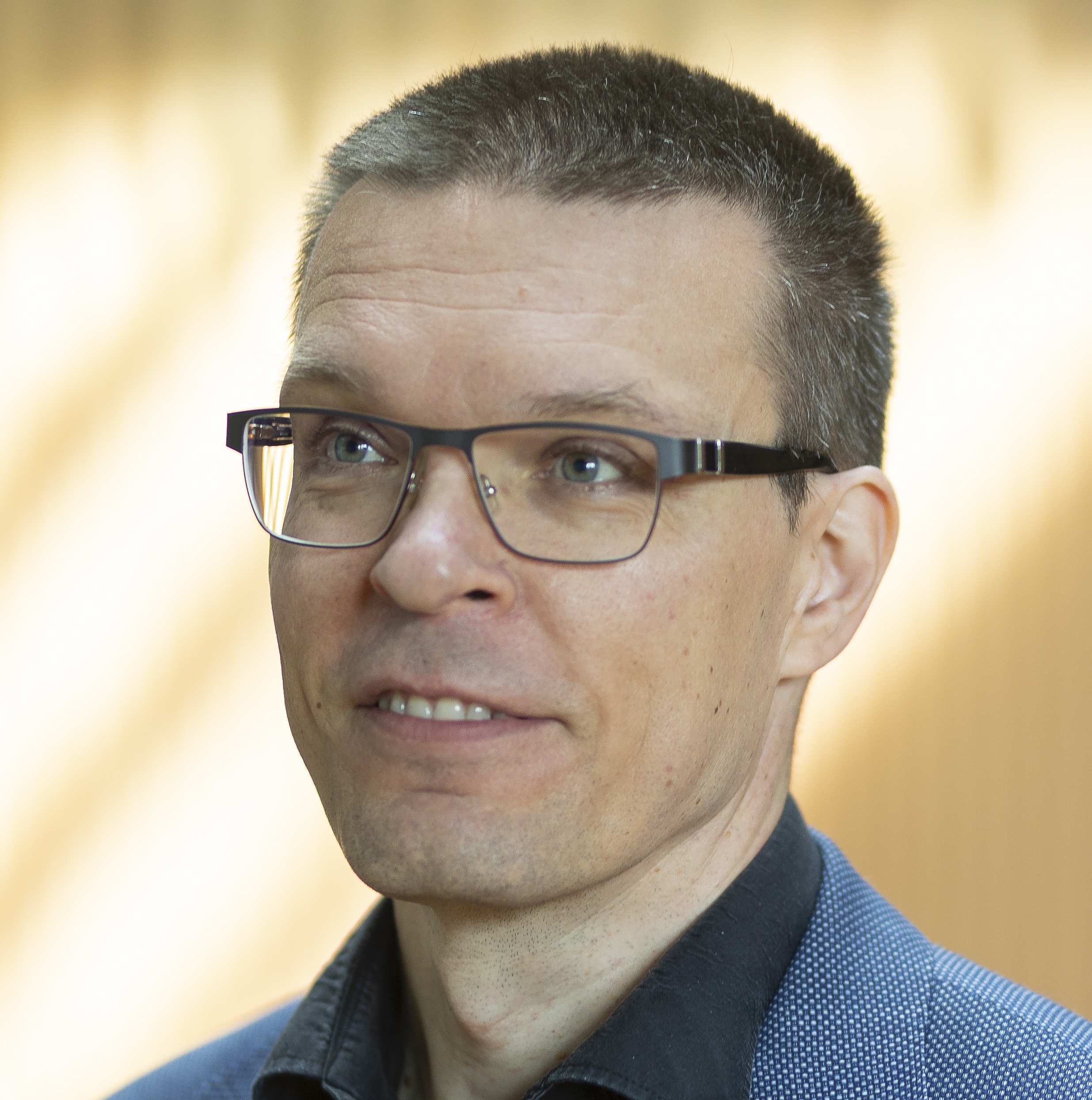 |
Talk 01. AI Collab. model., design & decision making Date: 2023, March, 20, (8:30 CET) Speaker: Prof. Samuel Kaski, Position: Professor Affiliation: Department of Computer Science, Aalto University, Aalto, Finland. |
 |
Talk 02. Predicting drug combination in cancer, Date: 2023, March, 20, (9:45 CET) Speaker: Prof. Juho Rousu, Position: Professor Affiliation: Department of Computer Science, Aalto University, Aalto, Finland. |
 |
Talk 03. Deep latent variable mod. for biomed. data, Date: 2023, March, 20, (11:00 CET) Speaker: Prof. Harri Lähdesmäki, Position: Associate Professor Affiliation: Department of Computer Science, Aalto University, Aalto, Finland. |
 |
Talk 04:. AI assistance for drug design tutorial, Date: 2023, March, 20, (14:00 CET) Speaker: MSc. Alex Hämäläinen, Position: Research Assistant Affiliation: Department of Computer Science, Aalto University, Aalto, Finland. |
 |
Talk 05. BNNs Efficient uncert. estim. Date: 2023, March, 21, (8:30 CET) Speaker: Dr. Trung Trinh, Position: Research Scientist Affiliation: SINTEF Industry, Oslo, Norway. |
 |
Talk 06. Neural network potentials and beyond, Date: 2023, March, 21, (9:45 CET) Speaker: Dr. Kristof Schutt, Position: Senior ML Research Scientist, Affiliation: PFIZER, Berlin, Germany. |
 |
Talk 07. Qptuna automated QSAR model building, Date: 2023, March, 21, (11:00 CET) Speaker: Dr. Lewis Mervin, Position: Assoc. Principal AI Scientist, Affiliation: AstraZeneca, Cambridge, United Kingdom. |
 |
Talk 08. Priors in Bayesian Deep Learning, Date: 2023, March, 21, (14:00 CET) Speaker: Dr. Tianyu Cui, Position: ML Research Associate, Affiliation: London Imperial College, London, United Kingdom. |
 |
Talk 09. Hybrid physics and AI pKa pred. in proteins, Date: 2023, March, 22, (9:45 CET) Speaker: Dr. Pedro Reis, Position: AI Molecular Modeling Researcher, Affiliation: BAYER, Berlin, Germany. |
 |
Talk 10. Hamiltonian Monte Carlo, Date: 2023, March, 22, (11:00 CET) Speaker: Prof. Aki Vehtari, Position: Associate Professor Affiliation: Dept. of Computer Science, Aalto University, Aalto, Finland. |
 |
Talk 11. EUOS/SLAS Kaggle Sol. Chall.: The Data. Date: 2023, March, 23, (8:30 CET) Speaker: Dr. Bernhard Rohde, Position: IT Expert, Affiliation: Novartis Pharma AG, Baselstadt, Basel, Switzerland. |
 |
Talk 12. The OCHEM EUOS/SLAS Sol. models, Date: 2023, March, 23, (9:45 CET) Speaker: Dr. Igor Tetko, Position: AIDD Coordinator, CHEMBIOINFO Chairman Affiliation: Helmholtz Zentrum München, Neuherberg, Germany. |



Welcome to the Summer School course Data-based justice. Artificial Intelligence and Data in Justice (DBJAI). This is a live summer course associated to the CATCHTOHIT and TECHLAWSCI congresses. The course is hosted by the University of The Basque Country (UPV/EHU) and is being promoted by the Direction of Entrepreneurship and Transfer at Campus of Biscay in UPV/EHU and the ZITEK business incubator. The Summer Course sessions are aimed at analyzing and debating two issues that will be relevant in the Justice system in the coming years: the use of applications based on technology called "Artificial Intelligence" and the management of massively processed data (Big Data) in the Justice system.An analysis of the new national and international normative framework is convenient to verify the applicability of this technology in the activity of judicial bodies. The experiences that the Ministry of Justice has already launched and those that will be developed soon (such as automatic document classification, documentary anonymization, textualization of views, biometrics as a personation system...) are examined, reflecting on the opportunities and risks that the use of this technology in Justice. The course will focus on analyzing and sharing, subjecting it to debate, the regulatory choice of the European Union and other regulatory advances both from the national and international point of view, for example, the proposal for a European Regulation on Artificial Intelligence or the next national regulation that on this matter includes Bill of Law on the Digital Efficiency. The application of Artificial Intelligence systems in Justice is unavoidable, and it can bring great advantages to achieve a more accessible and efficient Justice. But it also involves threats to the rights and guarantees inherent to the process that affect effective legal protection or the right to defense.
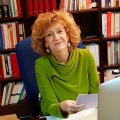 |
Talk 13. Prof. Silvia Barona Vilar. Professor of Litigation D. (Universitat València). She hold the Great Cross of San Raimundo de Peñafort. President of the Alexander von Humboldt-Spain Association. And President of the Court of Arbitration and Mediation of the Valencia Chamber. She is an arbitrator and mediator. With scientific training in Germany (DAAD, Max-Planck, Alexander von Humboldt grants), she is the author of 21 books; she co-authored more than 600 books, some of her direction. |
 |
Talk 14. Prof. Federico Bueno De Mata. Professor (accredited. Professor) of Procedural Law, University of Salamanca. Vice Dean F. Law, Co-director Master Digital Law, Director Master Legaltech; Director of the Higher Course in Oral Litigation, Director of the Higher Course in Law and Artificial Intelligence at USAL. |
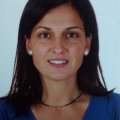 |
Talk 15. Prof Mª Angeles C. Benavente. Contracted Professor Doctor in the Department of Special Public Law and Business of the University of Santiago de Compostela. She has a PhD (2003) in Law from the Carlos III University of Madrid and from the Università degli Studi di Pisa (Italy) with the doctoral thesis: “The appeal of cassation and the violation of fundamental rights”. She is a member of the research group of the Alonso Martínez Institute of Justice and Litigation, of the Carlos III University of Madrid. She has research stays at the Max Planck Institute for International Criminal Law, in Freiburg (Germany), where she has participated in activities related to the fight against terrorism. She has published different investigations on Directive (EU) 2016/681, of April 27, regarding the use of PNR data. |
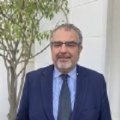 |
Talk 16. Prof. Ignacio Colomer Hernandez. Professor of Procedural Law, Pablo de Olavide University, Seville. Member of the Alonso Martínez University Institute of Justice and Litigation, Carlos III University. Member of the Academic Council Legal Artificial Intelligence Foundation (FIAL). Member of the European Criminal Law Network. Member of the Ibero-American Institute of Procedural Law. Vocal Secretary Sect. Special General Codification Commission for Reform of LECr. Member of the group in charge of drafting the Draft Bill for the Protection of Terrorism Victims, commissioned by the High Commissioner for Terrorism Victims, Mr. Gregorio Peces Barba. More than 150 publications in civil, criminal and contentious-administrative procedural law. |
 |
Talk 17. Prof. Pablo Cortes Dieguez. Professor in procedural law (Chair in Civil Justice) at the University of Leicester (England), where he teaches and researches conflict resolution. He graduated in law from the University of Vigo (Ourense Campus), completed a master's degree at the University of Limerick and defended his doctoral thesis on Online Dispute Resolution (ODR) at the University of Cork (Ireland) in 2008. Currently , also works part-time as an online arbitrator for CEDR, resolving civil disputes, mainly consumer disputes. |
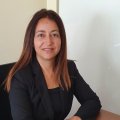 |
Talk 18. Prof. Dr. M. Josune Pérez Estrada, Faculty of Law, University of the Basque Country UPV/EHU, Leioa 48940, Spain. Associate Professor (titular accredited) of Procedural Law (UPV/EHU). Secretary of the Statutory and Regulatory Development Commission (UPV/EHU). Teaching Law Degree, Double Degree in Business Administration, Master's Degree in Law and Master's Degree in Personal Data, Cybersecurity and ICT Law (UPV/EHU). Member of the research group "Legal sciences applied to technosciences" IT1541-22 (UPV/EHU). Member of the research team of the research project "Keys for digital and algorithmic justice with a gender perspective (MICINN - PID2021-123170O8-I00). |
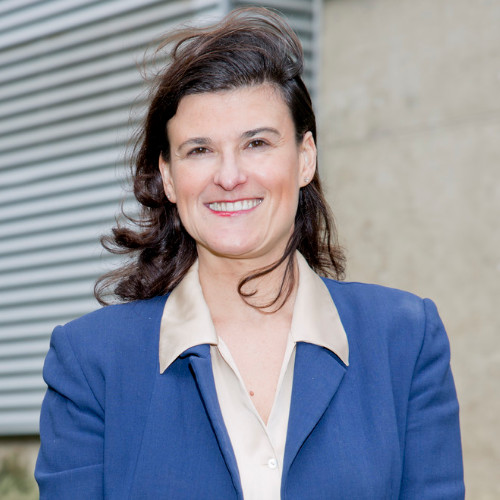 |
Talk 19. Prof. Noemí Peña. Director of Entrepreneurship and Transfer at Campus of Biscay and ZITEK programme Manager in University of The Basque Country (UPV/EHU). |
 |
Talk 20. Dr. Aliuska Duardo-Sanchez (Law.Lic., Ph.D. TICs & Legal Sciences) Post-Doc Researcher Univ. of Basque Country (UPV/EHU), 48940, Leioa, Grt. Bilbao, Basque Country, Spain. Visiting Postdoctoral Researcher (Chercheur Invité), Centre de Documentation et de Recherches européennes (CDRE), l'Université de Pau et des pays de l'Adour (UPPA), Bayonne, France. |
01. CHEMBIO.INFO-09: Cheminfo., Chemom., Comput. Quantum Chem. & Bioinfo. Congress München, GR-Chapel Hill, USA, 2023.

Welcome Message
CHEMBIOINFO Germany Co-Host Honor Chairman
Dr. Igor Tetko, Inst. of Struct. Biol., Helmholtz Zentrum München - German Research Center for Environmental Health (GmbH), Neuherberg, Germany. Email: i.tetko@helmholtz-muenchen.de
CHEMBIOINFO UK Co-Host Honor Chairman Dr. Yasset Perez-Riverol, European Bioinformatics Institute(EMBL-EBI), Cambridge, United Kingdom.
Dr. Yasset Perez-Riverol, European Bioinformatics Institute(EMBL-EBI), Cambridge, United Kingdom.
CHEMBIOINFO USA Co-Host Honor Chairman
Prof. Eugene Muratov, Laboratory for Molecular Modeling, UNC Eshelman School of Pharmacy, University of North Carolina , Chapel Hill , North Carolina 27599 , USA. Email: murik@email.unc.edu
CHEMBIOINFO Series Founder Steering Chairman Prof. Humbert González-Díaz,IKERBASQUE Professor, Email:mol2net.chair@gmail.com,
Prof. Humbert González-Díaz,IKERBASQUE Professor, Email:mol2net.chair@gmail.com,
(1) Dept. of Organic Chemistry II, University of the Basque Country UPV/EHU , 48940, Leioa, Biscay, Spain.
(2) IKERBASQUE, Basque Foundation for Science , 48011, Bilbao, Biscay, Spain.
ORCID: https://orcid.org/0000-0002-9392-2797
CHEMBIOINFO-08 Dedicated to Prof. Grammatica

Prof. Paola Gramatica, Full professor of Environmental Chemistry, Faculty of Sciences, Insubria University, Italy.
Email: paola.gramatica@uninsubria.it
CHEMBIOINFO-07 Dedicated to Prof. Todeschini
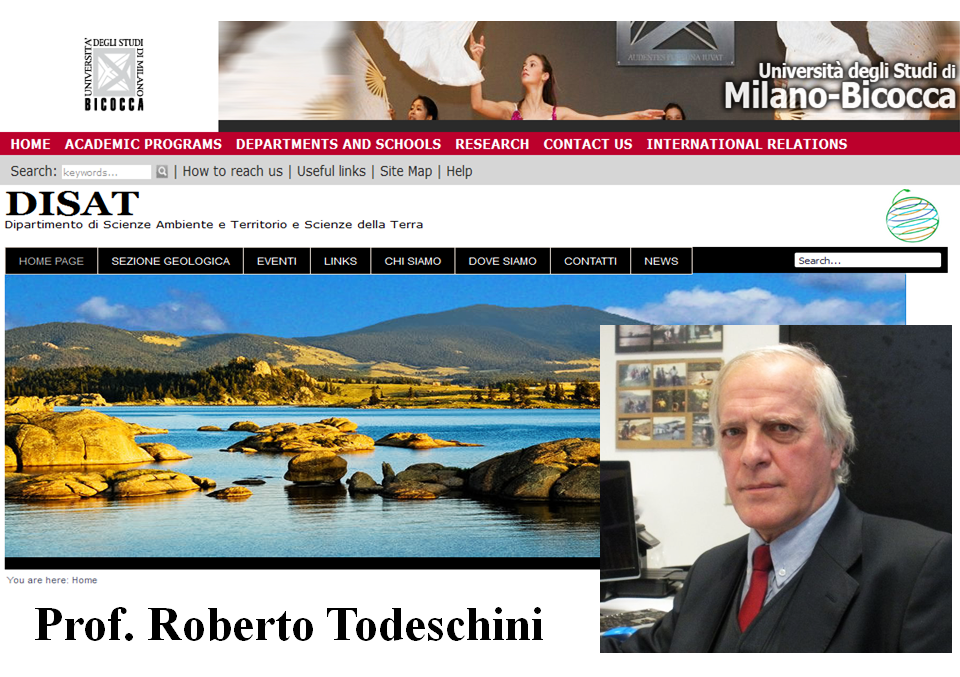
CHEMBIOINFO-06 Dedicated to Prof. Bonchev
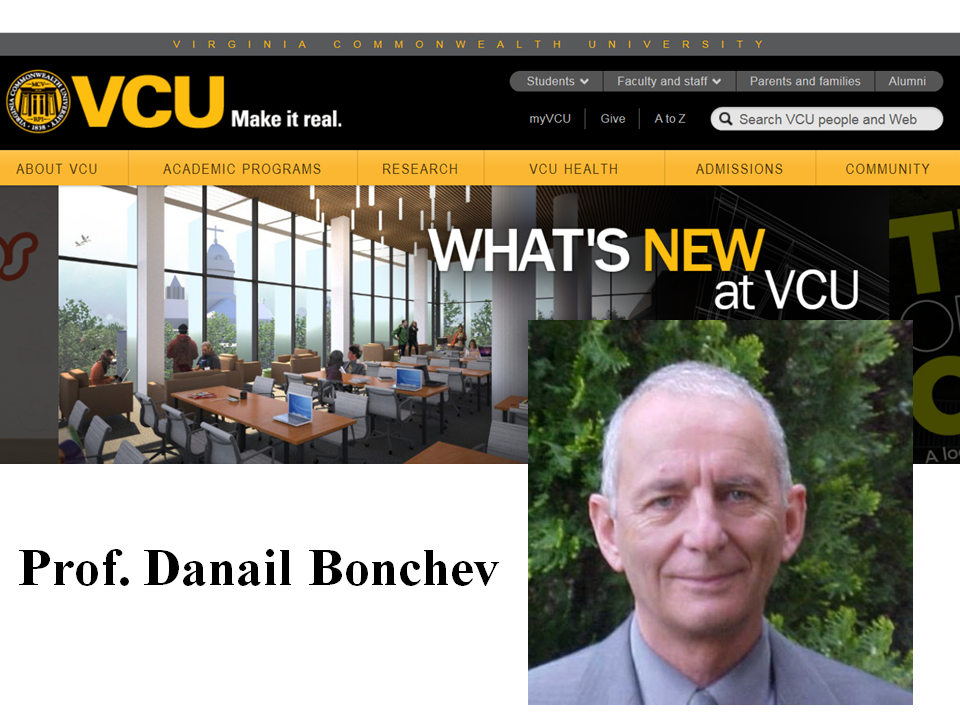
CHEMBIOINFO-09 Honor Advisory Scientific Committee

Prof. Stephan Schürer, Miller School of Medicine, Dept. of Molecular and Cellular Pharmacology, and Sylvester Comprehensive Cancer Center, University of Miami School of Medicine, Miami, FL, USA. Email: sschurer@miami.edu
Prof. Alexander Tropsha, Associated Dean UNC Eshelman School of Pharmacy, Associated Editor J. Chem. Info. Model., ACS, USA. University of North Carolina , Chapel Hill, 27599, North Carolina, USA. Email: alex_tropsha@unc.edu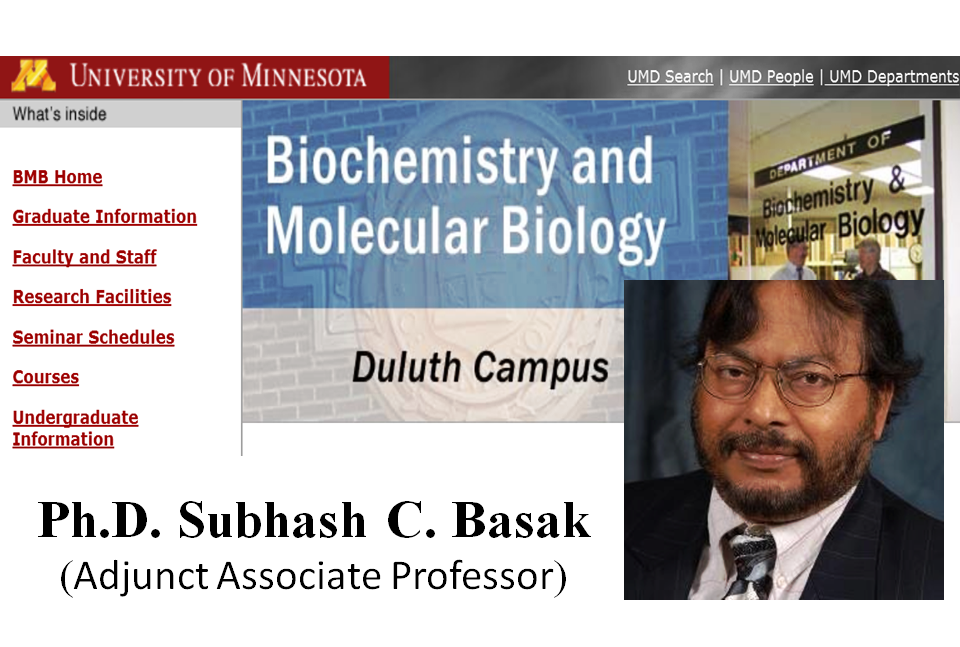
Prof. Dr. Subhash C. Basak, Senior Scientist and Adjunct Assoc. Prof., Dept. of Chemistry, University of Minnesota Twin Cities, MN, USA. (CHEMBIOINFO Co-chairman, USINEWS & IUWMC Chairman)

Prof. Weifan Zheng, Department of Pharmaceutical Sciences, North Carolina Central University, Durham, USA.
Email: wzheng@nccu.edu

AIDD School Series.
Advanced Machine Learning for Innovative Drug Discovery (AIDD) School is organized as part of the Marie Skłodowska-Innovative Training Network of the AIDD project (see sponsors bellow). Funding Agency: European Commision. Date: 2021-2024. AIDD project is being also sponsor of, associated to, and announced/co-published by the MOL2NET Congress CHEMBIOINFO: Cheminfo., Chemom., Bioinfo., Comput. & Quantum Chem. Congress Series München, GR-Cambridge, UK-Ch. Hill, USA, 2022-2024 on behalf of the School Coordinator: Dr. Igor Tetko (AIDD Coordinator and CHEMBIOMOL Co-Host Chairman), Inst. of Struct. Biol., Helmholtz Zentrum München - German Research Center for Environmental Health (GmbH), Neuherberg, Germany.
AIDD School Schedule & Programmed Speakers
AIDD School four edition is planned to run in person/online at Department of Computer Sciences, Aalto University, Aalto, Finland, March 20-23. Zoom links will be made available for public online attendance in the web of the school in due course. Please see AIDD School programmed talks and speakers at follows listed here on behalf of Dr I. Tetko (AIDD/CHEMBIOINFO Coordinator and Co-Host Chairman). See also all calls for webinars, zoom links, publications, speakers, topics, etc., related to the project and/or the school in the following link: https://ai-dd.eu/lectures.
| Speaker | Talk/Speaker Details |
 |
Talk 01: Title: Collab. model., design & decision making with AI, Date: 2023, March, 20, (8:30 CET) Speaker: Prof. Samuel Kaski, Position: Professor Affiliation: Department of Computer Science, Aalto University, Aalto, Finland. |
 |
Talk 02: Title: Predicting drug combination responses in cancer, Date: 2023, March, 20, (9:45 CET) Speaker: Prof. Juho Rousu, Position: Professor Affiliation: Department of Computer Science, Aalto University, Aalto, Finland. |
 |
Talk 03: Title: Deep latent variable mod. for long. biomed. data, Date: 2023, March, 20, (11:00 CET) Speaker: Prof. Harri Lähdesmäki, Position: Associate Professor Affiliation: Department of Computer Science, Aalto University, Aalto, Finland. |
 |
Talk 04: Title: AI assistance for drug design tutorial, Date: 2023, March, 20, (14:00 CET) Speaker: MSc. Alex Hämäläinen, Position: Research Assistant Affiliation: Department of Computer Science, Aalto University, Aalto, Finland. |
 |
Talk 05: Title: Efficient uncert. estim. with node-based BNNs, Date: 2023, March, 21, (8:30 CET) Speaker: Dr. Trung Trinh, Position: Research Scientist Affiliation: SINTEF Industry, Oslo, Norway. |
 |
Talk 06: Title: Neural network potentials and beyond, Date: 2023, March, 21, (9:45 CET) Speaker: Dr. Kristof Schutt, Position: Senior ML Research Scientist, Affiliation: PFIZER, Berlin, Germany. |
 |
Talk 07: Title: Qptuna: easy, automated QSAR model building, Date: 2023, March, 21, (11:00 CET) Speaker: Dr. Lewis Mervin, Position: Assoc. Principal AI Scientist, Affiliation: AstraZeneca, Cambridge, United Kingdom. |
 |
Talk 08: Title: Priors in Bayesian Deep Learning, Date: 2023, March, 21, (14:00 CET) Speaker: Dr. Tianyu Cui, Position: ML Research Associate, Affiliation: London Imperial College, London, United Kingdom. |
 |
Talk 09: Title: Hybrid physics and AI pKa pred. in proteins, Date: 2023, March, 22, (9:45 CET) Speaker: Dr. Pedro Reis, Position: AI Molecular Modeling Researcher, Affiliation: BAYER, Berlin, Germany. |
 |
Talk 10: Title: Hamiltonian Monte Carlo, Date: 2023, March, 22, (11:00 CET) Speaker: Prof. Aki Vehtari, Position: Associate Professor Affiliation: Dept. of Computer Science, Aalto University, Aalto, Finland. |
 |
Talk 11: Title: The Kaggle EUOS/SLAS Sol. Chall.: The Data, Date: 2023, March, 23, (8:30 CET) Speaker: Dr. Bernhard Rohde, Position: IT Expert, Affiliation: Novartis Pharma AG, Baselstadt, Basel, Switzerland. |
 |
Talk 12:The OCHEM EUOS/SLAS Sol. models, Date: 2023, March, 23, (9:45 CET) Speaker: Dr. Igor Tetko, Position: AIDD Coordinator, CHEMBIOINFO Chairman Affiliation: Helmholtz Zentrum München, Neuherberg, Germany. |








In parallel, the members of committees and/or authors are encouraged to edit special issues for different journals of the editorial MDPI (http://www.mdpi.com/). The special issues run in parallel, or totally independently from the conference. Manuscripts should be submitted online at www.mdpi.com by registering and logging in to this website. In order to send a proposal of associated workshop and/or special issue contact the chairperson of the conference Prof. González-Díaz H. Please, check the following special issues associated to the topic of the workshop.







CHEMBIO.INFO-09 Scientific Committee
Prof. Bakhtiyor Rasulev, Dept. Coat. & Polym. Mat., North Dakota State University (NDSU), Fargo, ND, USA.Dr. Subhash C. Basak, Dept. of Chemistry and Biochemistry, University of Minnesota, Duluth, MN, USA.
Prof. Matthew M. Montemore, Dept. Chem. & Biomol. Eng., Tulane University, New Orleans, LA, USA.
Prof. Oscar M. Rivera Borroto, Dept. Mathematics, Lone Star College System, Houston, TX,USA.
Dr. Gerardo M. Casañola, Dept. of Coat. and Polym. Mat., North Dakota State University, Fargo, ND, USA.
Dr. Diana M. Herrera-Ibatá, College of Vet. Med., Kansas State University, Manhattan, KS, USA.
Dr. Vincent Blay Roger, Lawrence Berkeley National Laboratory, Berkeley, CA, USA.
Prof. Irina Moreira, Center for Neuroscience and Cell Biology (CNC), Univ. of Coimbra, Coimbra, Portugal.Prof. Davide Ballabio, Chemometrics Group, Università of Milano-Bicocca (UNIMIB), Milano, Italy.
Dr. Andrey Toropov, Istituto di Ricerche Farmacologiche Mario Negri, Milano, Lombardy, Italy.
Prof. González-Díaz H., IKERBASQUE Professor, Email: mol2net.chair@gmail.com
(1) Dept. of Org. & Inorg. Chem., University of the Basque Country UPV/EHU, Basque Country, Spain.
(3) BIOFISIKA UPV/EHU-CSIC Institute, 48940, Leioa, Grt. Bilbao, Basque Country, Spain.
(2) IKERBASQUE, Basque Foundation for Science , 48011, Bilbao, Basque Country, Spain.
CHEMBIO.INFO Assistant Chairperson
Prof. Sonia Arrasate, Email: sonia.arrasate@ehu.eus
Dept. Org. & Inorg. Chem., Univ. of Basque Country (UPV/EHU), Basque Country, Spain.
CHEMBIO.INFO ICTs, Bioethics, & Regulatory Affairs Chairperson
Dr. Aliuska Duardo-Sanchez (Law.Lic., Ph.D. TICSs & Legal Sciences)
IKERDATA S.L. Data Protection Officer (DPO), ZITEK, Univ. of Basque Country (UPV/EHU),
Rectorate Building, Sarriena w/n, 48940, Leioa, Grt. Bilbao, Basque Country, Spain.
CHEMBIO.INFO Registration Manager
MSc. Harbil Bediaga, IKERDATA S.L. CEO, University of The Basque Country UPV/EHU
ZITEK, Office 6, Rectorate Building, 48940, Leioa, Greater Bilbao, Basque Country, Spain.
Link: https://www.ikerdata.com/, Email: adm@ikerdata.com
CHEMBIO.INFO Committee Assistant
MSc. Andrea Ruiz Escudero, IKERDATA S.L. INVESTIGO NextGenerationEU Researcher
University of The Basque Country UPV/EHU, ZITEK, Office 6, Rectorate Building,
Leioa, 48940, Greater Bilbao, Basque Country, Spain.
Link: https://www.ikerdata.com/, Email: ikerdata.andrearuiz@gmail.com
Show all published submissions (21) Hide published submissions (21)
Submissions
List of Papers (21) Toggle list
02. CHEMBIO.MOL-09: Org. Chem., Med. Chem., Mol. Biol., & Pharm. Industry Congress, Paris, France-Fargo, USA, 2023.

(YEAR-ROUND PUBLICATION, OPEN ACCESS, AND FREE OF CHARGE CONGRESS)
NANOBIO.MAT-09 series welcome contributions in all experimental and/or computational topics related to Biomaterials, Biotechnology, Material Sciences, Polymers, and Nanotechnology. The topics include, but are not limited to the sustainable development of new and safe molecules, materials, biomaterials, ceramics, liquid crystals, alloys, polymers, biopolymers, quatum dots, etc. with emphasis on Nanotechnology, Material Sciences, Polymers, Coating Materials, Nanotoxicology, Toxicology, Biomaterials, Biopolymers, Biotechnology, Biomarkers, Vaccines, Biofuels, Enzymes, Computational Materials and Nanosciences, Cheminformatics, Nanoparticle Drug Delivery Systems, etc. The workshop also deals with all the legal and regulatory uses related to the patenting, production, and use of nanoparticles, polymers, materials, etc. and their impact in human safety and environment.
Bioethics & Regulatory Topics: Last, not the least, all the three congresses deal with all the Legal, Regulatory, and Bioethics issues emerging from use of new experimental techniques and ICTs in the previous areas such as Drug Patenting, Drug re-purposing patents, Food Drug Administration (FDA) drug and vaccine approvals, Vaccine Emergency Use Listing (EUL) by World Health Organization (WHO), Europe Data Protection Regulation (GDPR), Proteome and Genome patentability, Synthetic Biology, Modified Organisms, Biomedical Personal Image Processing, Personal Data Protection, OECD Chemoinformatics regulation, Personalized Medicine, Software and Models Copyrights, etc.
(5) Follow the link in the email or login to upload paper (doc and pdf format).
(6) Login to post comments, questions, or answers in a section or in one of the MOL2NET workshops.
CHEMBIO.MOL-09 & NANOBIO.MAT-09 Honor Host Chairpersons

Prof. Bakhtiyor Rasulev, President of MOL2NET Scientific Committee for Polymers & Materials Sciences. Department of Coatings and Polymeric Material, North Dakota State University (NDSU), Fargo, USA. Email: bakhtiyor.rasulev@ndsu.edu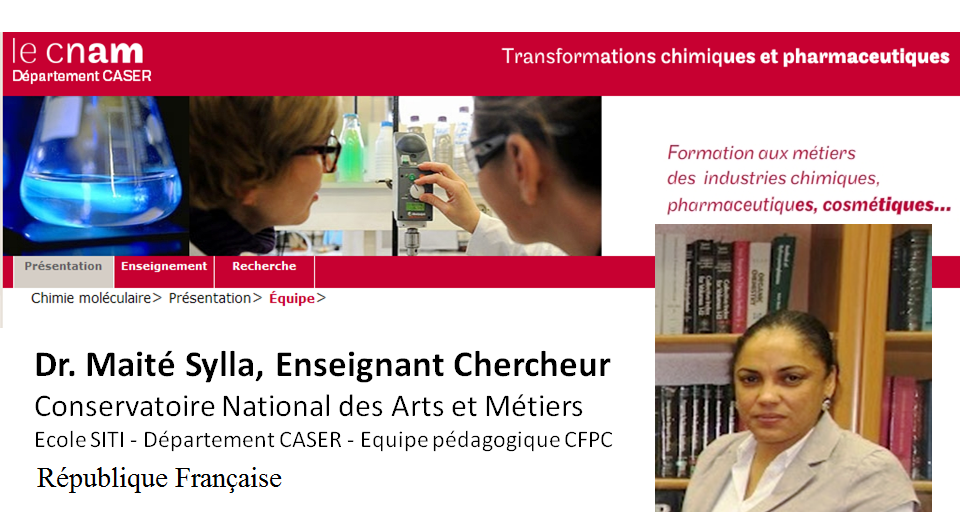
Prof. Maité Sylla, Assoc., Chimie Molécularie, Conservatoire National des Arts et Métiers CNAM, París, France.

Prof. Iseult Lynch, School of Geo., Earth and Environ. Sci., Univ. of Birmingham, Birmingham, United Kingdom.

Prof. Nuria Sotomayor, Dept. Org. & Inorg. Chem., University of Basque Country (UPV/EHU), Basque Country, Spain.

Prof. Aikaterini Lalatsa, Reader, Institute of Pharmacy and Biomedical Sciences, The University of Strathclyde, Glasgow, Scotland United Kingdom. NANOBIOMAT Executive Chairperson, Email: katerina.lalatsa@port.ac.uk
Dr. Tatiana Suarez Cortes, FAES FARMA, Head of Research, Development and Innovation Promotion.
R&D+i Department, Leioa, Greater Bilbao, Basque Country, Spain.

Prof. Ana Belen Jorge Sobrido, Reader, Sustainable Energy Materials, Queen Mary University of London, United Kingdom.

Dr. Yolanda de Miguel , Dir. Nanotechnology Cluster, TECNALIA, Basque Country, Spain. [TECNALIA NANOTECH, Youtube Cover]

Prof. Javier Meana, Department of Pharmacology, Faculty of Medicine, UPV/EHU, Campus Biscay.
(Coordinator UPV/EHU PhD Pharmacology Program)
Prof. Matthew M. Montemore, Dept. Chem. & Biomol. Eng., Tulane University, New Orleans, Louisiana, USA.
Prof. Bakhtiyor Rasulev, Dept. of Coat. and Polym. Mat., North Dakota State University (NDSU), Fargo, USA.
Dr. Diana Herrera, College of Veterinary Medicine, Kansas State University, Manhattan, Kansas, USA.
Dr. Gerardo M. Casañola, Dept. of Coat. and Polym. Mat., North Dakota State University, Fargo, ND, USA.
Prof. Shira Knafo, IKERBASQUE Prof., BIOFISIKA Center, UPV/EHU and Ben-Gurion Univ. of Negev, Israel.
Prof. Mª Teresa Herrero Corral, Dept. of Organic & Inorganic Chemistry, UPV/EHU, Basque Country, Spain.
Prof. Maria I. Moreno, Sec. Dept. of Organic and Inorganic Chemistry, UPV/EHU, Basque Country, Spain.
Prof. Uxue Uria Pujana, Dept. of Organic & Inorganic Chemistry, UPV/EHU,Basque Country, Spain.
Prof. Asier Benito-Vicente, Dept. of Biochemistry, Univ. of Basque Country (UPV/EHU), Basque Country, Spain.
Dr. Marta G. Lete, CIC bioGUNE, Center for Cooperative Research in Biosciences, Basque Country, Spain.
NANOBIO.MAT Scientific Committee
Dr. Gerardo M. Casañola, Dept. of Coat. and Polym. Mat., NDSU, North Dakota, Fargo, USA.
Prof. Juan M. Ruso, Dept. Applied Physics, University of Santiago de Compostela (USC), Spain.
Prof. Natalia D.S. Cordeiro, Dept. of Chem. and Biochem., University of Porto, Porto, Portugal.
Prof. Agnieszka Gajewicz, Assist. Prof., Faculty of Chemistry, University of Gdansk, Gdansk, Poland.
Prof. Ma. Auxiliadora Dea-Ayuela, Dept. of Pharm., University CEU Cardenal Herrera, Valencia, Spain.
Prof. Dolores R. Serrano, Dept. of Pharm. and Food Tech., University Complutense, Madrid, Spain,
Dr. Alla Toropova, Istituto di Ricerche Farmacologiche Mario Negri IRCCS, Milano, Italy.
Dr. Andrey Toropov, Istituto di Ricerche Farmacologiche Mario Negri IRCCS, Milano, Italy.
Prof. Juan M. Gutierrez-Zorrilla, Dept. of Org. & Inorg. Chem., UPV/EHU, Basque Country, Spain.
Prof. Antonio Luque, Dept. of Org. & Inorg. Chem., UPV/EHU, Basque Country, Spain.
Prof. Jose Luis Vilas, Dir. Dept. of Physical Chemistry, UPV/EHU, Basque Country, Spain.
Prof. Luis Lezama, Dept. of Org. & Inorg. Chem., UPV/EHU, Basque Country, Spain.
Prof. Izaskun Gil de Muro, Dir. Dept. of Org. & Inorg. Chem., UPV/EHU, Basque Country, Spain.
Prof. Maite Insausti, Dept. of Org. & Inorg. Chem., UPV/EHU, Basque Country, Spain.
Prof. Aintzane Goñi, Dept. of Org. & Inorg. Chem., UPV/EHU, Basque Country, Spain.
Prof. Oscar Castillo, Dept. of Org. & Inorg. Chem., UPV/EHU, Basque Country, Spain.
Prof. González-Díaz H., IKERBASQUE Professor, Email: mol2net.chair@gmail.com
(1) Dept. of Org. & Inorg. Chem., University of the Basque Country UPV/EHU, Basque Country, Spain.
(2) IKERBASQUE, Basque Foundation for Science , 48011, Bilbao, Basque Country, Spain.
CHEMBIO.MOL & NANOBIO.MAT Assistant Chairperson
Prof. Sonia Arrasate, Email: sonia.arrasate@ehu.eus
Dept. Org. & Inorg. Chem., Univ. of Basque Country (UPV/EHU), Basque Country, Spain.
CHEMBIO.MOL & NANOBIO.MAT Regulatory Affairs Chairperson
Dr. Aliuska Duardo-Sanchez (Law.Lic., Ph.D. TICs & Legal Sciences)
IKERDATA S.L. Data Protection Officer (DPO), ZITEK, Univ. of Basque Country (UPV/EHU),
Rectorate Building, Sarriena w/n, 48940, Leioa, Grt. Bilbao, Basque Country, Spain.
CHEMBIO.MOL & NANOBIO.MAT Committee Assistants
MSc. Harbil Bediaga, IKERDATA S.L. CEO, University of The Basque Country UPV/EHU
ZITEK, Office 6, Rectorate Building, 48940, Leioa, Greater Bilbao, Basque Country, Spain.
Link: https://www.ikerdata.com/, Email: adm@ikerdata.com
MSc. Maider Baltasar Marchueta, IKERDATA S.L., INVESTIGO NextGenerationEU Researcher
University of The Basque Country UPV/EHU, ZITEK, Office 6,
Rectorate Building, 48940, Leioa, Greater Bilbao, Basque Country, Spain.
Link: https://www.ikerdata.com/, Email: ikerdata.maider@gmail.com
MSc. Shan He, IKERDATA S.L. INVESTIGO NextGenerationEU Researcher
University of The Basque Country UPV/EHU, ZITEK, Office 6, Rectorate Building,
Leioa, 48940, Greater Bilbao, Basque Country, Spain.
Link: https://www.ikerdata.com/, Email: ikerdata.shan@gmail.com
03. NICE.XSM-09: North-Ibero-America Congress on Exp. & Simul. Methods, Valencia, Spain-Miami, USA, 2023.
NICE.XSM-09, TECHLAW.SCI-07, & CATCHTOHIT-04 Congresses and Associated Workshops
The present is a joint call of the congress NICE.XSM-09: North-Ibero-America Congress on Exp. & Simul. Methods, Valencia, Spain-Miami, USA, 2023 and its associated congresses and workshops . This include the congresses TECHLAW.SCI-07: Technol., Innovation, Trans. Research, & Law Sci. Congresses, Bayonne, France-Miami, USA, 2023., the associated workshop CATCHTOHIT-04: Congress on Academic Translational Research for Companies Helping to Heighten Innovation and Technology, Bilbao, Basque Country, Spain-Miami, USA, 2023, and the aPhyMath-NanoEC Congress, applied Physics and Mathematics, Data Science, Nanotechnology and Environmental Chemistry, Monterrey, Nuevo León, Mexico. All of them are congresses and workshops focused on the complementarity between classic experimental techniques and new computational technologies as well as with the scientific, technological, and management aspects of research and innovation (Chemistry, Biotech., Pharma., Biomed. Eng., AI, Data Analysis, Soft., etc.) for companies, startups, spinoffs, etc. We invite you to submit a paper to this multi-disciplinary section, c'mon joint us!!!
NICE.XSM'23
Welcome Message
NICE.XSM-09: North-Ibero-America Congress on EXperimental & Simulation Methods, Valencia, Bilbao, Spain - Miami, USA, 2023 is the first congress of this section. NICE.XSM series focus on the development of new experimental and computational methods are sometimes separated areas but more often runs hand-by-hand. This is an inter-university transatlantic joint congress co-chaired by USA and Europe institutions. In first instance, the founder chairs are professors of the Institute of Molecular Science (ICMol), University of Valencia (UV), and the Catholic University of Valencia (UCV), Valencia, Spain. From the America's side the workshop is co-hosted by professors of Department of Mathematics Miami Dade College (MDC) and Department of Chemistry and Biomolecular Engineering, Tulane University (TULANE), New Orleans, USA. All in all, the workshop is associated to the MOL2NET conference series. MOL2NET (From Molecules to Networks) series is running this year MOL2NET-2021, International Conference on Multidisciplinary Sciences, ISSN: 2624-5078, MDPI SciForum, Basel, Switzerland, 2021. Consequently, the present congress is co-chaired and promoted as well by researchers of the University of The Basque Country (UPV/EHU) and IKERBASQUE, Basque Foundation for Science, Bilbao, Basque Country.
Topics inclyded
Experimental methods. Made special emphasis on experimental methods and computer-assisted experimental methods in bio-molecular sciences and biomedical sciences. Examples of experimental methods of interest are those used on Biophysics, Molecular Biology, Medicinal Chemistry, Biomaterials, Biotechnology, Biomedical Engineering, etc. such as Microscopy, Spectroscopy (NMR, IR, Raman, X-Ray) for Biomolecules Characterization, Image recording methods (fNMRi), EEGG and ECG, etc.
Computational methods. This term includes, but is not limited to, Computational Biophysics, Computational Biology, Quantum Chemistry, Bioinformatics, Systems Biology, Complex Networks, Discrete Mathematics, Mathematical Analysis, Complex Networks Sciences, Statistics, Data Analysis, Artificial Intelligence (AI), Machine Learning, Deep Learning, etc. Last, not the least, the congress deals with all the Legal, Regulatory, and Bioethics issues emerging from the use of both experimental and modelling and simulation methods in the previous areas. This include, Drug, Gene, Protein, Vaccine, Biomarkers, and Biomaterials patentability, Personalized Medicine and Personal Data Protection, Cybersecurity, Cryptocurrency Mining, Data Protection in Personal Image Processing, Software and Models Copyrights, etc.
MOL2NET Transversal Associated Congresses and Workshops. MOL2NET Associated Workshops are special workshops published transversally in more than one MOL2NET congresses according to the specific topic of each paper. They are invited directly by the chairman, and/or proposed by others member of the committee, or collaborators who become chairmans of the workshop proposed by themselves. Consequently, these workshops may appear announced in more than one congress page. The authors of the communications submitted to this class of workshop have to select one of congress of the conference to submit their papers according to their criteria. The conference chairman reserves the right of reallocating the paper to other congress according to the topic. Please, see at follow the special workshop(s) associated to this congress.
aPhyMath-NanoEC Congress

aPhyMath-NanoEC Congress, applied Physics and Mathematics, Data Science, Nanotechnology and Environmental Chemistry, Monterrey, Nuevo León, Mexico. This conference focuses on the applications of exact sciences such as Mathematics, Computer Science, and Physics, for solving problems in industrial, academic, technological, and social fields. Promoters: It is promoted and intended fundamentally but not exclusively to disseminate the research work of students and professors of the Faculty of Physical and Mathematical Sciences of the Autonomous University of Nuevo León (UANL). The congress promotes the application of Multidisciplinary Sciences that also includes Natural Products, Nanotechnology, Environmental and Green Chemistry. It involves all topics included in NICE.XSM series. Working languages: English is the main working language of the congress, however, the congress intends to accept papers in English and Spanish.
CATCHTOHIT'23 Workshop
CEO, CIO, R&D Directors, Officers, Industry Consultants, Funding Agencies,
University Research Groups, Technological Centers, Students ...
R&D Company stands, Products advertising, Services offers, Software release, ... are welcome!!!
Folletos de empresas, Publicidad de productos, Ofertas de servicios, software, ... son bienvenidos!!!
Enpresen liburuxkak, Produktuen publizitatea, Zerbitzuen eskaintzak, Softwarearen, ... ongi etorriak dira!!!
CATCHTOHIT'23: Congress on Academic Translational Research for Companies Helping to Heighten Innovation and Technology, Bilbao, Basque Country, Spain-Doylestown, Pennsylvania-Gaithersburg, Cambridge, Massachusetts, USA, 2023. These congresses want to promote Academic Translational Research Universities, Research & Development (R&D) Clusters, and Technological Centers in collaboration with R&D Companies. The emphasis is in two main areas. On one side, we focus on Experimental Molecular Sciences and Biomedical Engineering and on the other side we focus on Sustainable Development, New Enabling Technologies, and Computational Sciences (see topics bellow). We welcome both contributions that interconnect at least two of these areas or specific contributions in one of these areas specifically. The ultimate objective is trying to increase the return to society of R&D public policies and/or private inversions. In this sense, we want to promote the transference of results from basic research to practice (e.g.; in Chemistry, Sustainable Fuel Production, Materials Science, Nanotechnology, ...) and/or from bench to bed side (e.g.; in Pharmaceutical Industry, Biomedical Engineering, Biotechnology, ... etc.). In consonance, our congress also wants to increase the collaboration of University Transference Offices, Research Spin-off Incubators, and Start-up companies with Small-Mid Size Enterprises (SMEs), Big Pharma, High-Tech, and Energy Companies.
| Modality (TRL Level) | Details |
| Basic to Translational Research Papers (TRL 1-4) |
Papers describing results of translational research per se (TRL 3-4) and/or papers of basic scientific research (TRL 4-6) with technology, innovation, or industrial interest. |
| Company Stands (TRL 8-9 to Final Products) |
Are company-centered online presentations of all the aims, objectives, interests, research necessities, offers, services, products, etc. of the SMEs company, you can include link to homepage, and contact info like email, LinkedIn, phone, etc. |
| Product Demo or Advertising (TRL 5-9 to Final Products) |
Are product centered online presentations describing all the scientific basis, specificities, advantages, etc. of an innovation or technological product or prototypes like e.g., drugs, catalysts, vaccines, diagnostic kits, nutraceuticals, reactants, biomaterials, may include contact info to buy the product. |
| Equipment Demo or Advertising (TRL 5-9 to Final Products) |
Is an equipment centered paper, you may include scientific basis of function of a technological equipment or prototype, demonstrations of the use of the equipment (videos), advantages, buying info, etc. Examples are DNA sequencers, Quantum computers, HPLC chromatograph or columns, Electrophoresis, High Resolution and Electronic Microscopes, X-Ray, NMR, MS, IR, or UV spectroscopy equipment, IR cameras, etc. |
| Software Releases (TRL 8-9 to Final Products) |
Short paper, user manual, etc. describing new scientific software, online platforms, APIs, Cybersecurity tools, Smartphone applications, Artificial Intelligence (AI) tools, etc., may include links to buying and downloading the software. |
| Technology White Papers (TRL 5-9) |
Short papers with a brief but somehow detailed description of the Technology Readiness Level (TRL), scientific basis, industrial specifications, etc. of a new technology or prototype. |
| Consortiums & Projects (TRL 1-9) |
Short presentations, posters, or whitepapers describing the generalities, objectives, members of a technology, innovation, and/or research consortium or project. Could refer to already stablished consortiums/projects or new (to be formed). May include calls for new partners to form a consortium for a competitive call from a funding agency, etc. |
| Service Offer (TRL 1-9) |
Concise but precise description of a scientific service like drug testing platform, sequencing platform, spectroscopy general service, technology consulting service, regulatory issues consultancy, etc. May include links, contact information, etc. of the service provider. |
TECHLAWSCI'23 Workshop

Bioethics, Sustainability, Environmental, & Regulatory Topics: Last, not the least, the congress deals with all the Bioethics, Sustainability, Environmental, and Regulatory issues emerging from the R&D, technological, industrial, and commerce activity such as Drug Patenting, Food Drug Administration (FDA) drug and vaccine approvals, Europe Data Protection Regulation (GDPR), Proteome and Genome patentability, Synthetic Biology, Genetically Modified Organisms (GMOs), Biomedical Personal Image Processing, Personal Data Protection, OECD Guidelines for Enterprises, Chemical Testing, etc., Personalized Medicine, Software, Cybersecurity, Models Copyrights, etc.
Biomol. & Medical Sciences, Law, & Bioethics. Patentability in plants and human genomics. Clinical procedures’ standards. Personalised Medicine and Patients’ personal data protection, informed consent. Regulatory issues in Vaccine design, Drug Discovery, Biomedical research legislation. Medical affairs, medico-legal problems, healthcare malpractice, medical insurance or ethics in medical practice, and social sciences. Taxes in the Biotechnology industry and causality/liability in environmental pollution, criminology, etc.

Welcome to the Summer School course Data-based justice. Artificial Intelligence and Data in Justice. This is a live summer course associated to the CATCHTOHIT and TECHLAWSCI congresses. The course is hosted by the University of The Basque Country (UPV/EHU) and is being promoted by the Direction of Entrepreneurship and Transfer at Campus of Biscay in UPV/EHU and the ZITEK business incubator. The Summer Course sessions are aimed at analyzing and debating two issues that will be relevant in the Justice system in the coming years: the use of applications based on technology called "Artificial Intelligence" and the management of massively processed data (Big Data) in the Justice system.An analysis of the new national and international normative framework is convenient to verify the applicability of this technology in the activity of judicial bodies.
 |
Prof. Silvia Barona Vilar. Professor of Litigation D. (Universitat València). She hold the Great Cross of San Raimundo de Peñafort. President of the Alexander von Humboldt-Spain Association. And President of the Court of Arbitration and Mediation of the Valencia Chamber. She is an arbitrator and mediator. With scientific training in Germany (DAAD, Max-Planck, Alexander von Humboldt grants), she is the author of 21 books; she co-authored more than 600 books, some of her direction. |
 |
Prof. Federico Bueno De Mata. Professor (accredited. Professor) of Procedural Law, University of Salamanca. Vice Dean F. Law, Co-director Master Digital Law, Director Master Legaltech; Director of the Higher Course in Oral Litigation, Director of the Higher Course in Law and Artificial Intelligence at USAL. |
 |
Prof Mª Angeles C. Benavente. Email: angeles.catalina@usc.es |
 |
Prof. Ignacio Colomer Hernandez. Professor of Procedural Law, Pablo de Olavide University, Seville. Member of the Alonso Martínez University Institute of Justice and Litigation, Carlos III University. Member of the Academic Council Legal Artificial Intelligence Foundation (FIAL). Member of the European Criminal Law Network. Member of the Ibero-American Institute of Procedural Law. |
 |
Prof. Pablo Cortes Dieguez. Professor in procedural law (Chair in Civil Justice) at the University of Leicester (England), where he teaches and researches conflict resolution. |
 |
Course Director Prof. Dr. M. Josune Pérez Estrada, Faculty of Law, University of the Basque Country UPV/EHU, Leioa 48940, Spain. Associate Professor (titular accredited) of Procedural Law (UPV/EHU). Secretary of the Statutory and Regulatory Development Commission (UPV/EHU). Member of the research group "Legal sciences applied to technosciences" IT1541-22 (UPV/EHU). Member of the research team of the research project "Keys for digital and algorithmic justice with a gender perspective (MICINN - PID2021-123170O8-I00). |
 |
Course Promotor Prof. Noemí Peña. Director of Entrepreneurship and Transfer at Campus of Biscay and ZITEK programme Manager in University of The Basque Country (UPV/EHU). |
NIECXSM and Associated Congresses and Workshop(s) Submission. Publication of all communications of the congresses will be online via the platform SciForum. We welcome submissions of communications in original .doc files (mandatory) and pdf presentation files (mandatory), as well as ppt presentations (optional), or mpg videos (optional). We also welcome proposals for organization of congresses in different universities or announcement of MDPI special issues. Please, do not hesitate to contact conference chairperson and/or scientific committee presidents. We strongly recommend to download the conference template to write your communications [MOL2NET'23 Template.doc]. Please, follow these steps to submit and register your paper:
(1) Submit abstract using online platform and wait for acceptance email. Do not register at this moment.
(2) In case your abstract is accepted, please upload the .pdf, .doc, .ppt, and/or .mpg files of your conference paper.
(3) In case your paper is accepted perform the Registration, Waiver Request, or APC/REGF payment (mandatory previous publication).
NIECXSM Working Languages. English is the main working language of the workshop. However, as a North-Ibero-American inclusive conference the workshop aims to accept papers to be published in multiple languages spoken on the countries, states, and communities of the entire North-Ibero-American area of influence. It involve, but is not limited to: México, Brazil, Spain, Portugal, USA, Canada, Chile, Ecuador, Basque Country, Catalunya, Valencia, Galicia, etc. Consequently, we accept papers on the following languages: English, Spanish, Portuguese, French, Basque (Euskera), Catalá / Valenciano, and Galego. We also accept bi-lingual posters in two-column format, e.g, English-Basque, English-Spanish, English-Portuguese, Spanish-Galego, etc.
(0) Register, Sign in/Login, to Sciforum platform [Sciforum login] (All the year).
(1) Submit the title and abstract, select a section or workshop (do not upload paper here) [Submit New Abstract] (until Dec-25).
(2) Wait for Sciforum abstract acceptance email, follow the link, and/or login to upload paper, doc and pdf format (until Dec-25):
(3) Download template doc and prepare your communication (until Dec-25).
(4) Wait for paper acceptance and publication emails (follow link to proofread your paper) (Asap after upload).
(5) Communicate with chairpersons if corrections are necessary, including past editions (All the year).
(6) Log in to post comments, questions, or answers in a section or one of the workshops (Dec-25 to end).
(7) Contact chairpersons if you need publication/attendance (posting) certificate (All the year).

Email: gloria.castellano@ucv.es
 Prof. Francisco Torrens, (NICEXSM Founder Chairperson), Inst. of Molecular Science (ICMol), Univ. of Valencia (UV), Valencia, Spain.
Prof. Francisco Torrens, (NICEXSM Founder Chairperson), Inst. of Molecular Science (ICMol), Univ. of Valencia (UV), Valencia, Spain.Email: francisco.Torrens@uv.es


Prof. David Quesada, Nova Southeastern University, Miami, FL, USA.
 Prof. Natalia D.S. Cordeiro, Dept. of Chemistry and Biochemistry, University of Porto, Porto, Portugal.
Prof. Natalia D.S. Cordeiro, Dept. of Chemistry and Biochemistry, University of Porto, Porto, Portugal.Email: ncordeir@fc.up.pt

Prof. Jorge Gálvez, Dept. of Physical Chemistry, Faculty of Pharmacy, University of Valencia, Spain.

Prof. Deyani Nocedo Mena, PhD Professor, Autonomous University of Nuevo León (AUNL), México. deyani.nocedomn@uanl.edu.mx

Prof. Oxana Vasilievna Kharissova, PhD Professor, Autonomous University of Nuevo León (AUNL), México.

Prof. Marcus Tullius Scotti, Univ. Federal da Paraíba - Campus I, João Pessoa, Paraíba, Brasil.
Emails: mscotti@ccae.ufpb.br

CEO MSc. Juan B. Arrue Mendizabal, BEAZ S.A., ZITEK Business Incubator, Prof. Business Organization, Engineering School, University of The Basque Country UPV/EHU, Bilbao, Basque Country, Spain.
Dr. Tatiana Suarez Cortes, CIO FAES FARMA, Head of Research, Development and Innovation Promotion, R&D+i Department, Leioa, Greater Bilbao, Basque Country, Spain. (Honor Committee and Co-Host Chairperson)
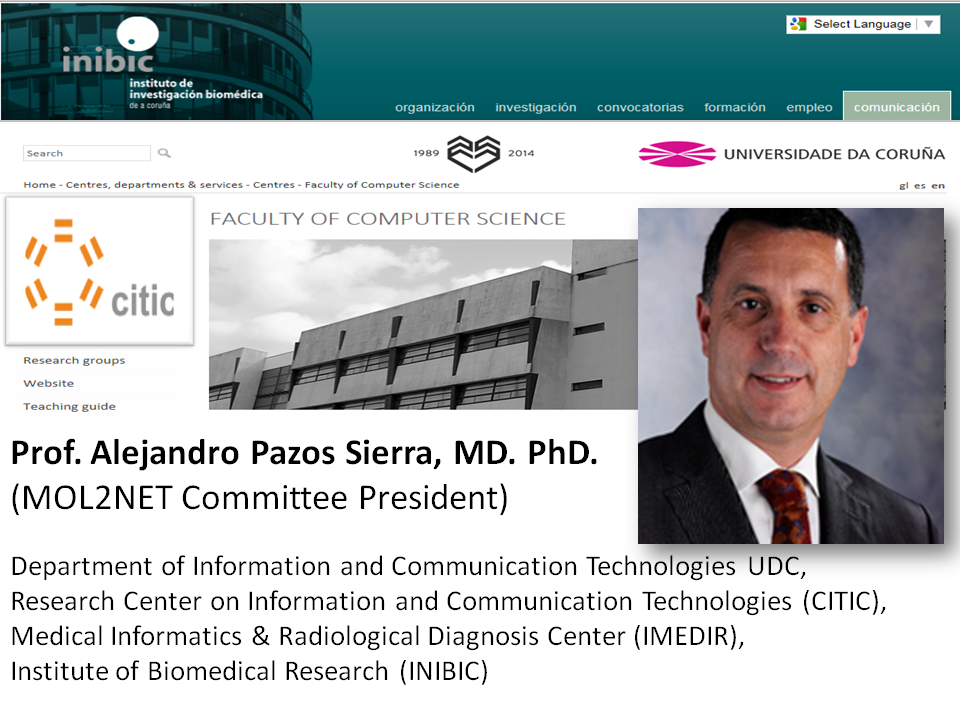 COB Prof. Alejandro Pazos, IKERDATA S.L., Ph.D., M.D., Chair, Dir. Dept. Comput. Sci., Univ. of Coruña (UDC), Coruña, Galicia, Spain. (Honor Committee and Co-Host Chairperson)
COB Prof. Alejandro Pazos, IKERDATA S.L., Ph.D., M.D., Chair, Dir. Dept. Comput. Sci., Univ. of Coruña (UDC), Coruña, Galicia, Spain. (Honor Committee and Co-Host Chairperson)

Dr. Yolanda de Miguel , TECNALIA, CIO Dir. Nanotechnology Cluster, Zamudio, Basque Country, Spain. (Honor Committee)
 Prof. PhD. Prof. Humbert González-Díaz, IKERBASQUE Professor, Email:mol2net.chair@gmail.com, (1) Dept. of Organic Chemistry & Inorganic Chemistry, University of the Basque Country UPV/EHU , 48940, Leioa, Biscay, Spain. (2) BIOFISIKA, Basque Center for Biophysics, University of the Basque Country UPV/EHU , 48940, Leioa, Biscay, Spain. (3) IKERBASQUE, Basque Foundation for Science , 48011, Bilbao, Biscay, Spain. (4) IKERDATA S.L. UDC-UPVEHU, ZITEK, Co-Founder and Member of Scientific Advisory Board, Leioa, Basque Country, Spain. (MOL2NET & CATCH4HIT Academy-Industry Founder Steering Chairman)
Prof. PhD. Prof. Humbert González-Díaz, IKERBASQUE Professor, Email:mol2net.chair@gmail.com, (1) Dept. of Organic Chemistry & Inorganic Chemistry, University of the Basque Country UPV/EHU , 48940, Leioa, Biscay, Spain. (2) BIOFISIKA, Basque Center for Biophysics, University of the Basque Country UPV/EHU , 48940, Leioa, Biscay, Spain. (3) IKERBASQUE, Basque Foundation for Science , 48011, Bilbao, Biscay, Spain. (4) IKERDATA S.L. UDC-UPVEHU, ZITEK, Co-Founder and Member of Scientific Advisory Board, Leioa, Basque Country, Spain. (MOL2NET & CATCH4HIT Academy-Industry Founder Steering Chairman)
 MOL2NET TECHLAWSCI & CATCHTOHIT Bioethics and Legal Affairs Chairperson
MOL2NET TECHLAWSCI & CATCHTOHIT Bioethics and Legal Affairs ChairpersonDr. Aliuska Duardo-Sanchez (Law.Lic., Ph.D. TICSs & Legal Sciences) Post-Doc Researcher Univ. of Basque Country (UPV/EHU), 48940, Leioa, Grt. Bilbao, Basque Country, Spain. Visiting Postdoctoral Researcher (Chercheur Invité), Centre de Documentation et de Recherches européennes (CDRE), l'Université de Pau et des pays de l'Adour (UPPA), Bayonne, France.

NICE.XSM Scientific Committee
Prof. Gloria Castellano, Dir. Dept. of Exp. Sci. and Math., Catholic University of Valencia (UCV), Valencia, Spain.
Show all published submissions (20) and accepted abstracts (1)
Hide published submissions (20) and accepted abstracts (1)
Prof. Francisco Torrens, Inst. of Molecular Science (ICMol), Univ. of Valencia (UV), Valencia, Spain.
Prof. Matthew M. Montemore, Dept. Chem. & Biomol. Eng., Tulane University, New Orleans, LA, USA.
Prof. Diana M. Herrera-Ibatá, College of Vet. Med., Kansas State University, Manhattan, KS, USA.
Dr. Gerardo M. Casañola, Dept. of Coat. and Polym. Mat., North Dakota State University, Fargo, ND, USA.
Dr. Robersy Sánchez, Dept. of Biology, The Pennsylvania State University, Univ. Park, PA, USA.
Prof. Oscar M. Rivera Borroto, Dept. Mathematics, Houston Community College, Houston, TX, USA.
Prof. Facundo Pérez Giménez, Department of Phys. Chemistry, University of Valencia, Spain.
Prof. Jesus V. De Julián Ortiz, Department of Physical Chemistry, University of Valencia, Spain.
Prof. José Ignacio Bueso Bordils, Dept. of Pharmacy, University CEU Cardenal Herrera, Spain.
Prof. Alejandro Pazos, Ph.D., M.D., Dept. Comput. Sci., Univ. of Coruña (UDC), Coruña, Spain.
Prof. Emilio Martinez-Nunez, Dept. of Physical Chemistry, Faculty of Chemistry, USC, Spain.
Dr. Maria Galvez-Llompart, Dept. of Phys. Chem., Fac. of Pharm., Univ. of Valencia, Spain.
Prof. Enrique Onieva, DEUSTOTECH Institute, University of Deusto, Bilbao, Spain.
Dr. Riccardo Zanni, Dept. of Phys. Chem., Fac. of Pharm., Univ. of Valencia, Spain.
Prof. Irina Moreira, CNC, Universidade de Coimbra, Coimbra, Portugal.
Dr. Guillermin Agüero, CIIMAR/CIMAR, University of Porto, Portugal.
Prof. Jose L Medina-Franco, Univ. Nac. Aut. de México (UNAM), México.
Prof. Carlos Polanco, Dept. of Math., Univ. Nac. Aut. de México (UNAM), México.
Prof. Ihosvany Camps, Federal University of Alfenas (UNIFAL-MG), Brazil.
Prof. Luciana Scotti, Universidade Federal da Paraíba, Campus I, Paraíba, Brasil.
Prof. Yovani Marrero-Ponce, University San Francisco de Quito, Quito, Ecuador.
Prof.
04. BIOMODE.ECO-08: Biotech., Mol. Eng., Nat. Prod. Develop. and Ecology Congress, Paris, France-Ohio, USA, 2023.
Welcome to the BIOMODE.ECO-08, Biotechnology, Molecular Engineering, Natural Products Development, and Ecology Congress, From Forest to Oceans, Paris, France - Ohio, USA, 2023. This congress focus on the research on Molecular Engineering, Natural Products, Green Chemistry, Environmental Chemistry, Sustainability, Climate Change, and Ecology, connected to Development, Environmentally Friendly Industrialization and Energy Development of forests, oceans, coastal regions, and natural resources. The congress promotes the application of the Multidisciplinary Sciences for Natural Products, Environmental, and Green Chemistry, Climate research, Ecosystems preservation, Sustainable Energy, and Fuels production, Hydrogen economy, Circular Economy, etc. It put emphasis on natural products and agro-industrial processes in Amazon, Africa, Asia, along with Pacific and Atlantic Oceans coastal regions. It involves methodologies ranging from experimental chemistry, chemical engineering, biomolecular sciences, computational methods, economical, social, bioethics, and regulatory affairs.
Promoters. This is a trans-Atlantic inter-university congress. On the Americas' side the congress is chaired and co-hosted by professors/researchers of the Center for Environmental Solutions and Emergency Response (CESER), Environment Protection Agency (EPA), USA. From Europe's side the workshop is chaired and co-hosted by researchers and professors of the Interdisciplinary Centre of Marine and Environmental Research (CIIMAR), University of Porto (UPORTO), Porto, Portugal, and Université de La Rochelle, La Roche (ULAROCHELLE), Laboratoire LIENSs Littoral Environnement et Sociétés (LIENSs), Institut Écologie et Environnement (INEE), French National Centre for Scientific Research (CNRS), Paris, France. Locally, the congress is supported by professors/researchers from Basque Center for Climate Change (BC3) and Chair on Sustainable Development and Environmental Education (GIEIHB) of United Nations Educational, Scientific and Cultural Organization (UNESCO). The congress was founded and is co-chaired and promoted by researchers of the Department of Organic and Inorganic Chemistry, University of The Basque Country (UPV/EHU) endowed by IKERBASQUE, Basque Foundation for Science, Bilbao, Basque Country, Spain.
Host Conference. The congress is associated to and hosted online by the MOL2NET'22, Conference on Molecular, Biomedical, and Computational Sciences and Engineering, 8th ed, ISSN: 2624-5078, MDPI SciForum, Basel, Switzerland. This conference is hosted online by the SciForum platform supported by Multidisciplinary Digital Publication Institute (MDPI), Basel, Switzerland with roots in the Molecular Diversity Preservation International (MDPI) institute. Please, contact the congress chairman for further details.
Working Languages. English is the main working language of the congress. However, as a North-Ibero-American-Europe inclusive conference the congress aims to accept papers to be published in multiple languages spoken on the countries, states, and communities of the entire North-Ibero-American-Europe area of influence. It involve, but is not limited to: France, México, Brazil, Spain, Portugal, USA, Canada, Ecuador, Chile, Basque Country, Catalunya, Valencia, Galicia, etc. Consequently, we accept papers on the following languages: English, Spanish, French, Portuguese, Basque (Euskera), Catalá / Valenciano, and Galego. We also accept bi-lingual posters in two-column format, e.g, English-Basque, English-Spanish, France-English, English-Portuguese, Spanish-Galego, etc. Other languages than those cited above may be considered but it could conditioned to the fluency of the experts in the reviewing panel.
Publication Modalities. There are two separated routes for publication. Firstly, all communications submitted directly to the workshop will be Published Online Free of Charge open year round. In addition, all authors are invited to submit by separate (optional) full paper versions of their communications to the MDPI journal associate special issue, in this case (APC apply). In th first case, communications submitted to the workshop are expected to be short papers or posters consisting of 1-3 pages. Be aware that the submission is a two step process. First you must register and submit a tentative title, authors list and abstract. Next, you need to submit your full publication upon acceptance of the abstract by the committee. Full communications submited to workshop will be in the Sciforum platform, with doi number as soon as possible upon acceptance. If you are planning to submit a publication, please use the following template, [MODEC 2020 Template.doc]. In the case of MDPI special issues, submission is totally be separate in the issue page, please see the following information.
BIOMODECO-MDPI Journal Special Issues

Metabolites (Published): Special Issue: oxicity and Ecotoxicity Mechanisms of Heavy Metals on Human Health and Environment. Journal: Metabolites (ISSN 2218-1989), IF = 5.581. Editors: Dr. Rashid Mir, Department of Medical Laboratory Technology, Division of Molecular Biology, University of Tabuk, Tabuk 71491, Saudi Arabia. Prof. Marianne Graber, Laboratoire LIENSs Littoral Environnement et Sociétés, Institut écologie et environnement (IEE), French National Centre for Scientific Research (CNRS), Paris, France. Submission until: 2023-Agu-20.



Topics of Interest: The topics of the conference, include, but are not limited to: Biomolecular Engineering; Biotechnology; Ecology; Sustainable Development; Energy and Fuels production; Hydrogen economy; Biofuels; Chemical engineering; Marine chemical pollution; Marine and Forest Microorganisms; Marine and Forest environment; Metabolomics; Microbial biofilms formation. Experimental and Computational chemistry, Cheminformatics and Bioinformatics of Forest and Marine Natural products. Mathematical modelling of Natural, Climate, Biotechnological, Agricultural, and Environmental Process. Organic and Functional Foods of Forest and Ocean origin. BioTrade: Sustainability and Trading of Natural Products of the Amazon and Coastal regions. Production systems with agro-business and forestry purposes or biomass for energy purposes. Environmental impacts in Forest and Ocean of Climate Changes and Industrial exploitation. Geographic Information Systems (GIS) for Climate and Land cover monitoring and forecasting. Agro-industrial development processes.
Authors liability. Before to submit your work be aware that the editorial publication model of this workshop is similar to a PREPRINT service. It means that works presented here have to be considered only as preliminary communications and not as final post-print versions of journal papers. In this sense, even when all the works published are revised by at least one member of the committee and/or external reviewer this level of revision checks only apparent scientific soundness and general scientific interest. In a second level, collective post-publication review, the works published may receive comments (published in the form of posts) from all the participants registered in the conference. The authors are prompted to use all these opinions to write the full versions of their works and submit them to publication in a peer-reviewed scientific journals according to SciForum copyright rules. In any case, the authors are the only one responsible of the veracity of the contents, checking similarity to other works, citing properly previous works, etc.
BIOMODECO Honor Chairpersons

Dr Gerardo Ruiz-Mercado, Center for Environmental Solutions and Emergency Response, United States Environmental Protection Agency (EPA), Ohio, USA. Email: ruiz-mercado.gerardo@epa.gov
Prof. Marianne Graber, Directrice Adjointe Relations Internationales, Faculté des Sciences et Technologies, Université de La Rochelle, La Roche, France. Chercheur, Laboratoire LIENSs Littoral Environnement et Sociétés, Institut écologie et environnement (IEE), French National Centre for Scientific Research (CNRS), Paris, France. Email: marianne.graber@univ-lr.fr Prof. Oscar M. Rivera Borroto, Dept. Mathematics, Lone Star College System, CyFair, Houston, Texas, USA.
Prof. Oscar M. Rivera Borroto, Dept. Mathematics, Lone Star College System, CyFair, Houston, Texas, USA.
(BIOMODECO Founder) Dr. Gerardo M. Casañola, Dept. of Coat. and Polym. Mat., North Dakota State University, Fargo, North Dakota, USA.
Dr. Gerardo M. Casañola, Dept. of Coat. and Polym. Mat., North Dakota State University, Fargo, North Dakota, USA.
(BIOMODECO Founder)

Prof. Ibone Ametzaga Arregi, Director UNESCO Chair - Sustainable Development and Environmental Education (GIEIHB), Director of MSc. on Environmental Sustainability, Univ. of Basque Country (UPV/EHU), Basque Country, Spain.

Prof. Sonia Arrasate, Director of MSc. on Environmental Sustainability, Dept. of Org. and Inorg. Chem., Univ. of Basque Country (UPV/EHU), IKERDATA S.L. UDC-UPVEHU, ZITEK, Co-Founder and Scientific Advisory Board Member, Leioa, Basque Country, Spain. Bizkaia. Email: sonia.arrasate@ehu.eus
 Dr. Guillermin Agüero, CIIMAR, Interdisciplinary Centre of Marine and Environmental Research, University of Porto, Portugal.
Dr. Guillermin Agüero, CIIMAR, Interdisciplinary Centre of Marine and Environmental Research, University of Porto, Portugal.
Email: gchapin@ciimar.up.pt
BIOMODECO Scientific Committee
Prof. Bakhtiyor Rasulev, Dept. Coat. & Polym. Mat., North Dakota State University (NDSU), Fargo, ND, USA.
Dr. Subhash C. Basak, Dept. of Chemistry and Biochemistry, University of Minnesota, Duluth, MN, USA.
Prof. Oscar M. Rivera Borroto, Dept. Mathematics, Lone Star College System, Houston, TX,USA.
Dr. Gerardo M. Casañola, Dept. of Coat. and Polym. Mat., North Dakota State University, Fargo, ND, USA.
Dr. Diana M. Herrera-Ibatá, College of Vet. Med., Kansas State University, Manhattan, KS, USA.
Dr. Vincent Blay Roger, Lawrence Berkeley National Laboratory, Berkeley, CA, USA.
Prof. Eugene Muratov, UNC Eshelman School of Pharmacy, Univ. of North Carolina, USA.
Prof. Terace Fletcher, Northeast Lakeview College, University of Texas, San Antonio, TX, USA.
Prof. Agostinho Antunes, CIIMAR Research Centre, Univ. of Porto, Porto, Portugal.
Prof. Raquel Esteban, Dept. of Plant Biology and Ecology, UPVEHU, Basque Country, Spain.
Prof. Juan P. Gomez Martín, Univ. Rey Juan Carlos, Spain and Petrogenium, Netherlands.
Dr. Dany Domínguez Pérez, CIIMAR Centre, University of Porto, Porto, Portugal.
Prof. Marcus T. Scotti, Univ. Federal da Paraíba, João Pessoa, Paraíba, Brasil.
Prof. Luciana Scotti, Universidade Federal da Paraíba, Paraíba, Brasil.
Prof. Karel Diéguez Santana, Univ. Regional Amazónica Ikiam, Tena, Ecuador.
Prof. Viviana Quevedo, Universidad Estatal Amazónica (UEA), Puyo, Ecuador.
Prof. Amaury Pérez Martínez , Universidad Estatal Amazónica, Ecuador.
Prof. Estela Guardado, Universidad Estatal Amazónica, Ecuador.
BIOMODECO Publication Steering Chairman
Prof. Humbert G. Díaz, IKERBASQUE Prof., Email: mol2net.chair@gmail.com
(1) Department of Organic Chemistry II and Basque Center for Biophysics,
University of the Basque Country UPV/EHU, Leioa, Biscay, Basque Country, Spain.
(2) IKERBASQUE, Basque Foundation for Science, Bilbao, Basque Country, Spain.![]() ORCID: https://orcid.org/0000-0002-9392-2797
ORCID: https://orcid.org/0000-0002-9392-2797
BIOMODECO Publication Assistant Chairperson
Prof. Sonia Arrasate, Email: sonia.arrasate@ehu.eus
Dept. Org. & Inorg. Chem., Univ. of Basque Country (UPV/EHU), Basque Country, Spain.
BIOMODECO ICTs, Bioethics & Regulatory Affairs Chairperson
Dr. Aliuska Duardo-Sanchez , Data Protection Officer (DPO)
IKERDATA S.L., ZITEK, Univ. of Basque Country (UPV/EHU),
Leioa, 48940, Greater Bilbao, Basque Country, Spain.
BIOMODECO Registration Manager
MSc. Harbil Bediaga, IKERDATA S.L. CEO, University of The Basque Country UPV/EHU
ZITEK, Office 6, Rectorate Building, 48940, Leioa, Greater Bilbao, Basque Country, Spain.
Link: https://www.ikerdata.com/, Email: adm@ikerdata.com
BIOMODECO Congress Assistant
MSc. Estefania Ascencio Medina, IKERDATA S.L. INVESTIGO NextGenerationEU Researcher
University of The Basque Country UPV/EHU, ZITEK, Office 6, Rectorate Building,
48940, Leioa, Greater Bilbao, Basque Country, Spain.
Link: https://www.ikerdata.com/, Email: ikerdata.estefania@gmail.com
Congress Chair
Prof. Dr. Sonia Arrasate, Dept. of Organic and Inorganic Chemistry, University of The Basque Country UPV/EHU, Leioa, 48940, Greater Bilbao, Basque Country, Spain.
05. USEDAT.NET: USA-Europe Data Analysis Trends & Complex Networks Mini Congress Series, Coruña, SP-Miami, USA, 2023
USEDAT.NET'23 & AI.MED'23 joint call
The present is a joint call of the congress USEDAT.NET: USA-Europe Data Analysis Trends & Complex Networks Mini Congress Series, Coruña, Spain-Miami, USA, 2023 and the workshop AI.MED: Artificial Intelligence (AI), Neurosciences, Medical Informatics, and Biomedical Engineering Congress, Coruña, Spain-Miami, USA, 2023. Both of them are congresses/workshops focused on the development of new computational technologies (AI, ML, Statistics, Data Analysis, Big Data, Image Analysis, Pattern Recognition, Databases, Software Programming, etc.) and their applications applications to Chemistry, Biotech., Pharma., Biomed. Eng., etc., c'mon joint us!!!
USEDAT.NET'23

USEDAT.NET: USA-Europe Data Analysis Trends & Complex Networks Mini Congress Series is a Multi-center Trans-Atlantic initiative offering both scientific meetings and hands-on training courses active since 2015. This dual training course and scientific congress program admit students coming from both areas with strong computational background (Computer sciences, Mathematics, Physics). However, we specially welcome students from areas with experimental background (Chemistry, Engineering, Biology, Biotechnology, etc.).

(5) Follow the link in the email or login to upload paper (doc and pdf format).
(6) Login to post comments, questions, or answers in a section or in one of the MOL2NET workshops.
USEDAT.NET & AIMEDIC Congress Co-Host Chairpersons
 Prof. Alejandro Pazos, Ph.D., M.D., Chair Professor, (1) Department of Computer Science and Information Technologies, Faculty of Computer Science, University of A Coruña, CITIC. Campus Elviña s/n, 15071, A Coruña, Spain. (2) Group of Networks of Artificial Neurons and Adaptive Systems - Medical Imaging and Radiological Diagnosis (RNASA-IMEDIR). Biomedical Research Institute of A Coruña (INIBIC). University Hospital Complex of A Coruña (CHUAC), Sergas. University of Coruña (UDC). Xubias de arriba 84, 15006, A Coruña, Spain.
Prof. Alejandro Pazos, Ph.D., M.D., Chair Professor, (1) Department of Computer Science and Information Technologies, Faculty of Computer Science, University of A Coruña, CITIC. Campus Elviña s/n, 15071, A Coruña, Spain. (2) Group of Networks of Artificial Neurons and Adaptive Systems - Medical Imaging and Radiological Diagnosis (RNASA-IMEDIR). Biomedical Research Institute of A Coruña (INIBIC). University Hospital Complex of A Coruña (CHUAC), Sergas. University of Coruña (UDC). Xubias de arriba 84, 15006, A Coruña, Spain.

Prof. Vanessa Aguiar Pulido, Dept. Comput. Science, University of Miami, Miami, FL, USA.

Prof.David Quesada, Nova Southeastern University (NSU), Miami, FL, USA.
Prof. Bakhtiyor Rasulev, North Dakota State University (NDSU), Fargo, ND, USA.
Dr. Subhash C. Basak, University of Minnesota, Duluth, MN, USA.
Prof. Matthew M. Montemore, Tulane University, New Orleans, LA, USA.
Prof. Oscar M. Rivera Borroto, Lone Star College System, Houston, TX,USA.
Dr. Gerardo M. Casañola, North Dakota State University, Fargo, ND, USA.
Dr. Diana M. Herrera-Ibatá, Kansas State University, Manhattan, KS, USA.
Dr. Vincent Blay Roger, Lawrence Berkeley National Laboratory, Berkeley, CA, USA.
Prof. Víctor Maojo García, AI Department, Polytechnic University of Madrid, Madrid, Spain.
Prof. Fernando Martin, Biomedical Informatics, Carlos III Health Institute, Madrid, Spain.
MD PhD. Francisco X. Romero-Duran, INDAUTXU Clinic, Bilbao, Basque Country, Spain.
Prof. Julián Dorado de La Calle, Fac. of Informatics, University of Coruña, Galicia, Spain.
Prof. Carlos Fernandez-Lozano, Fac. of Informatics, University of Coruña, Galicia, Spain.
Prof. Nieves Pedreira, Fac. of Informatics, University of Coruña, Galicia, Spain.
Prof. Javier Pereira, Fac. of Informatics, University of Coruña, Galicia, Spain.
Prof. Ana B Porto-Pazos, Fac. of Informatics, University of Coruña, Galicia, Spain.
Prof. Juan R. Rabuñal, Fac. of Informatics, University of Coruña, Galicia, Spain.
Prof. Marcos Gestal Pose, Fac. of Informatics, University of Coruña, Galicia, Spain.
Prof. Adrián Carballal Mato, Fac. of Informatics, University of Coruña, Galicia, Spain.
Prof. Enrique Fernández Blanco, Fac. of Informatics, University of Coruña, Galicia, Spain.
AIMEDIC Steering Publication Chairman
Prof. Humbert G. Díaz, IKERBASQUE Professor, Email: mol2net.chair@gmail.com
(1) Department of Organic Chemistry II and Basque Center for Biophysics, University of the Basque Country UPV/EHU , 48940, Leioa, Biscay, Basque Country, Spain. (2) IKERBASQUE, Basque Foundation for Science , 48011, Bilbao, Biscay, Basque Country, Spain. ORCID: https://orcid.org/0000-0002-9392-2797
AIMEDIC Assistant Chairperson
Prof. Sonia Arrasate, Email: sonia.arrasate@ehu.eus
Dept. Org. & Inorg. Chem., Univ. of Basque Country (UPV/EHU), Basque Country, Spain.
AIMEDIC ICTs, Bioethics & Regulatory Affairs Chairperson
Dr. Aliuska Duardo-Sanchez (Law.Lic., Ph.D. TICs & Legal Sciences)
IKERDATA S.L. Director of Legal Affairs, Postdoctoral Researcher at Dept. of Public Law,
University of Basque Country (UPV/EHU), Campus Biscay, Leioa 48940, Basque Country, Spain.
AIMEDIC Committee Assistant
MSc. Andrea Ruiz Escudero, IKERDATA S.L. INVESTIGO NextGenerationEU Researcher
University of The Basque Country UPV/EHU, ZITEK, Office 6, Rectorate Building,
Leioa, 48940, Greater Bilbao, Basque Country, Spain.
Link: https://www.ikerdata.com/, Email: ikerdata.andrearuiz@gmail.com
06. REVIEWWWERS.PUB-09, Reviewers, Pre-Prints, & Post-Publication Workshop, Bilbao-Miami, USA, 2023.

Dear all Thank you for your contribution to our conference MOL2NET-09, Conference on Molecular, Biomedical, Computational, & Network Science and Engineering, ISSN: 2624-5078, MDPI SciForum, Basel, Switzerland, 2023. The MOL2NET-09 Conference is now closed for submissions. Thanks to your support, we attracted >10 USA-EU events, >200 participants, >140 communications and talks, >10000 followers in social media etc.
Instructions to Post-publication reviewwwers.
Now that MOL2NET-09 submissions are closed we are launching, as every year, the REVIEWWWERS.PUB-09, Reviewers, Pre-Prints, & Post-Publication Workshop, Bilbao-Miami, USA, 2023. REVIEWWERS.PUB = MOL2NET Reviewers on World Wide Web of Pre-Prints & Post-Publication Workshop Series, Bilbao-Miami, USA, 2023. This is the pre/post-publication workshop of MOL2NET'23 conference series. Please, participate in this reviewers workshop making public comments/questions to authors of different coomunications. Participation is very easy, these are the steps:
Step (1), Register/Login here on the Sciforum platform at the link https://login.mdpi.com/login .
Step (2), go to MOL2NET'23 list of works at the link https://mol2net-09.sciforum.net/presentations/ view.
Step (3), scroll down the list of articles and click on a title.
Step (4): Read the article and then scroll down and click on the Comment button, post your comment/question, always in a constructive tone, and click submit.
Step (5): Repeat the review process for other articles.
Step (6), Check your email for responses from the authors and counter-argue/thank them for it if you think it is necessary.
Step (7), Remember to check your email if you have had questions about your own work(s) and answer them.
Step (8), Request certificate to email: mol2net.chair@gmail.com.
Authors liability.
Remember that our conference publish only pre-print papers and post-print/post-publication summary content. It means that, this conference is a way for authors to communicate their earlier results (pre-print) and/or discuss already published results from their/others groups (post-print discussion). Consequently, in all cases, it is responsibility of authors, to ensure veracity and originality of the content. Authors are recommended to performing a similarity checking, ensure veracity of contents, and carry out a proper citation of previous works. In this sense, we strongly recommend the authors to use online text-similarity checking services, if possible. These tools may help authors to avoid any form of plagiarism or copyright violation.
Committee liability.
The committee is not responsible of the previous aspects (similarity, veracity, proper citation) in this publishing modality. Consequently, the opinions expressed on the communications are not necessarily coincident to the opinions of the members of the committee. The authors may be requested to modify the communication (re-write their texts) in the case that high similarity is detected by a third part and reported to the committee. The committee may decide to take-down from public web (unpublishing) a communication if sufficient evidence of violation of ethic veracity or originality principles is reported according to committee criteria. In these cases, the manuscript could be put on standby or withdrawn temporarily until the authors re-submit the proper version. In the post-print/post-publication discussion communications the authors are also allowed to submit short reviews, comments, letters, critical assays, opinions, or discussions of papers already published. The scientific committee of the early view publication workshop is composed by selected advisory experts worldwide and some section chairpersons of different congresses who have participated in the pre-screening of abstracts.
Reviewwwers role.
The Sciforum platform, host of this conference, allows you to perform post-publication review of papers. MOL2NET conference opens all years a post-publication stage. On this stage each year we prompt reviewers worldwide to perform post-publication reviews/comments about of papers published the year before and interact online with the authors of all these communications. By getting involved you can become a certified reviewer of conference communications acting over the web. One this modality of the workshop we invite all members of committee, authors, and validated social network followers, to become post-publication reviewers of all papers published the year before in our conference. They can make public questions to authors, suggest new collaborations, etc.
Inter-congress cross-commenting.
Cross-commenting of authors of one workshop to other workshop are specially welcome. People invited are professors, researchers, PhD/MSc students, and science writers with validated LinkedIn, ResearchGate, ORCID, or Publons profiles. We aware our reviewers to take into consideration that most papers published are preliminary pre-print versions. Consequently, the objective is not to perform a detailed review of the papers. The objective is to call the attention of authors over interesting points, do recommendations to improve the paper, propose collaborations, etc. Comments will be moderated by our staff. We also offer webinars and free of cost certified reviewers training. Please, follow these steps to patriciate.
Instrucciones a los autores
Estimado(s) autor(es), gracias por su contribución a nuestra conferencia MOL2NET-09, Conference on Molecular, Biomedical, Computational, & Network Science and Engineering, ISSN: 2624-5078, MDPI SciForum, Basel, Switzerland, 2023.
En estos momentos la conferencia está cerrada para envios y hemos comenzado la ronda de Post-publicación con preguntas/comentarios en línea a los autores mediante el evento REVIEWWWERS.PUB-09, Reviewers, Pre-Prints, & Post-Publication Workshop, Bilbao-Miami, USA, 2023.
También les invitamos a participar en el Taller REVIEWWWERS.PUB, que ya está abierto, realizando preguntas a otros autores.
Los pasos son muy fáciles. Instrucciones:
Paso (0), Regístrese/Inicie sesión aquí en la plataforma Sciforum [Registrarse/Iniciar sesión], enlace https://login.mdpi.com/login.
Paso (2), vaya a [Lista de artículos MOL2NET'23] enlace https://mol2net-09.sciforum.net/presentations/view.
Paso (3), desplácese hacia abajo en la lista de artículos y haga clic en un título.
Paso (4), Lea el artículo y luego desplácese hacia abajo y haga clic en el botón Comentar, publique su comentario/pregunta, siempre en un tono constructivo, y haga clic en enviar.
Paso (5), Repita el proceso de revisión para otros artículos.
Paso (6), Verifique en su correo electrónico respuestas de los autores y contra-argumente/agradesca por ello si lo cree necesario.
Paso (7), Recuerde verificar en su correo si ha tenido preguntas a su(s) propio(s) trabajo(s) y respondala(s).
Paso (8), Solicitar certificado al correo electrónico: mol2net.chair@gmail.com.
MOL2NET REVIEWWWERS Scientific committee
CHEMBIO.MOL & NANO.MAT (Congress Chairman): Prof. Bakhtiyor Rasulev, President of MOL2NET Scientific Committee for Polymers & Materials Sciences. Department of Coatings and Polymeric Material, North Dakota State University (NDSU), Fargo, USA. Email: bakhtiyor.rasulev@ndsu.edu
BIOMODE.ECO (Congress Chairman): Dr Gerardo Ruiz-Mercado, Center for Environmental Solutions and Emergency Response, United States Environmental Protection Agency (EPA), Ohio, USA. Email: ruiz-mercado.gerardo@epa.gov

Email: gloria.castellano@ucv.es
 NICE.XSM (Congress Chairman): Prof. Francisco Torrens, Inst. of Molecular Science (ICMol), Univ. of Valencia (UV), Valencia, Spain.
NICE.XSM (Congress Chairman): Prof. Francisco Torrens, Inst. of Molecular Science (ICMol), Univ. of Valencia (UV), Valencia, Spain.Email: francisco.Torrens@uv.es

MOL2NET Scientific Committee Chairperson: Prof. Sonia Arrasate, Director of MSc. on Environmental Sustainability, Dept. of Org. and Inorg. Chem., Univ. of Basque Country (UPV/EHU), IKERDATA S.L. UDC-UPVEHU, ZITEK, Co-Founder and Scientific Advisory Board Member, Leioa, Basque Country, Spain. Bizkaia. Email: sonia.arrasate@ehu.eus
 MOL2NET TECH.LAW Bioethics and Legal Affairs Chairperson: Dr.Aliuska Duardo-Sanchez(Law.Lic., Ph.D. TICSs & Legal Sciences) Director of Legal Affairs (DLA) and Data Protection Officer (DPO), IKERDATA S.L., ZITEK,Univ. of Basque Country (UPV/EHU), Rectorate Building, Sarriena w/n, 48940, Leioa, Grt. Bilbao, Basque Country, Spain. Visiting Postdoctoral Researcher (Chercheur Invité),Centre de Documentation et de Recherches européennes (CDRE), l'Université de Pau et des pays de l'Adour (UPPA), Bayonne, France.
MOL2NET TECH.LAW Bioethics and Legal Affairs Chairperson: Dr.Aliuska Duardo-Sanchez(Law.Lic., Ph.D. TICSs & Legal Sciences) Director of Legal Affairs (DLA) and Data Protection Officer (DPO), IKERDATA S.L., ZITEK,Univ. of Basque Country (UPV/EHU), Rectorate Building, Sarriena w/n, 48940, Leioa, Grt. Bilbao, Basque Country, Spain. Visiting Postdoctoral Researcher (Chercheur Invité),Centre de Documentation et de Recherches européennes (CDRE), l'Université de Pau et des pays de l'Adour (UPPA), Bayonne, France.
(1) Dept. of Org. & Inorg. Chem., University of the Basque Country UPV/EHU, Basque Country, Spain.
(3) BIOFISIKA UPV/EHU-CSIC Institute, 48940, Leioa, Grt. Bilbao, Basque Country, Spain.
(2) IKERBASQUE, Basque Foundation for Science , 48011, Bilbao, Basque Country, Spain.
MOL2NET REVIEWWWERS.PUB Conference Assistants Committee
MOL2NET - REV.PUB Conference Assistant & Manager
PhD.Harbil Bediaga, IKERDATA S.L. CEO, University of The Basque Country UPV/EHU
ZITEK, Office 6, Rectorate Building, 48940, Leioa, GreaterBilbao,Basque Country, Spain.
Email: adm@ikerdata.com
CHEMBIO.MOL & NANO.MAT - REV.PUB Conference Assistant
MSc.Shan He, IKERDATA S.L. INVESTIGO NextGenerationEU Researcher
University of The Basque Country UPV/EHU, ZITEK, Office 6, Rectorate Building,
Leioa, 48940, GreaterBilbao,Basque Country, Spain.
Email:ikerdata.shan@gmail.com
CHEMBIO.INFO-REV.PUB Conference Assistant
MSc. Andrea Ruiz Escudero, IKERDATA S.L. INVESTIGO NextGenerationEU Researcher
University of The Basque Country UPV/EHU, ZITEK, Office 6, Rectorate Building,
Leioa, 48940, GreaterBilbao,Basque Country, Spain.
Email:ikerdata.andrearuiz@gmail.com
BIOMODE.ECO, CATCHTOHIT, TECH.LAW - REV.PUB Conference Assistant
MSc.Estefania Ascencio Medina, IKERDATA S.L. INVESTIGO NextGenerationEU Researcher
University of The Basque Country UPV/EHU, ZITEK, Office 6, Rectorate Building,
48940, Leioa, GreaterBilbao,Basque Country, Spain.
Email:ikerdata.estefania@gmail.com
CHEMBIO.MOL - REV.PUB Conference Assistant
MSc.Maider Baltasar Marchueta,
IKERDATA S.L., INVESTIGO NextGenerationEU Researcher
University of The Basque Country UPV/EHU, ZITEK, Office 6,
Rectorate Building, 48940, Leioa, GreaterBilbao,Basque Country, Spain.
Email: ikerdata.maider@gmail.com



































